Sustainability Leadership in Unilever
VerifiedAdded on 2023/06/12
|18
|4780
|130
AI Summary
This paper explores the case of sustainability in Unilever and how transformational servant leadership style is helping business organisations to grow. It delves into the values and ethics in Unilever and its impact on personal action. The paper includes a literature review on transformational and servant leadership, and how transformative servant leadership is used in business organisations. The subject is sustainability leadership and the course code, name, and university are not mentioned.
Contribute Materials
Your contribution can guide someone’s learning journey. Share your
documents today.
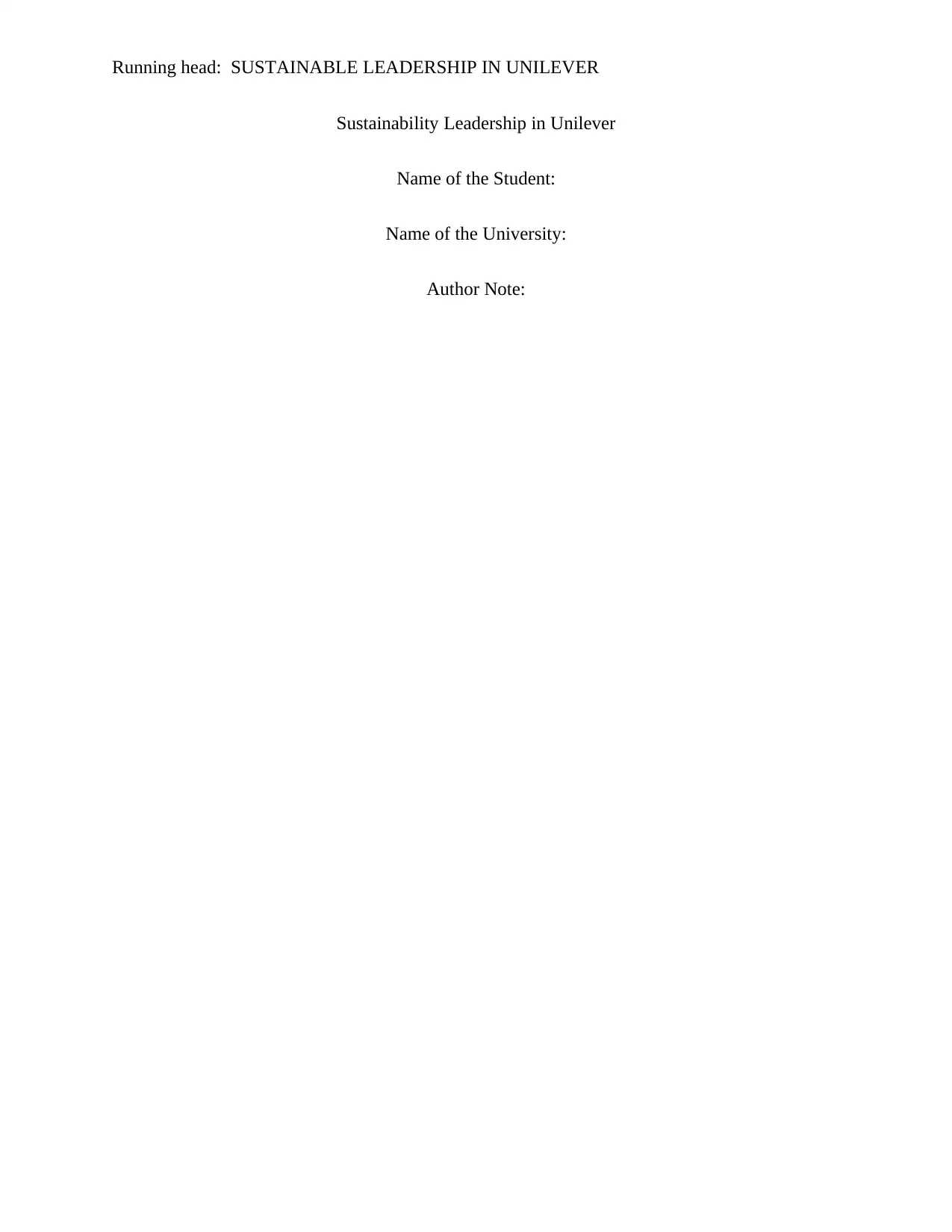
Running head: SUSTAINABLE LEADERSHIP IN UNILEVER
Sustainability Leadership in Unilever
Name of the Student:
Name of the University:
Author Note:
Sustainability Leadership in Unilever
Name of the Student:
Name of the University:
Author Note:
Secure Best Marks with AI Grader
Need help grading? Try our AI Grader for instant feedback on your assignments.
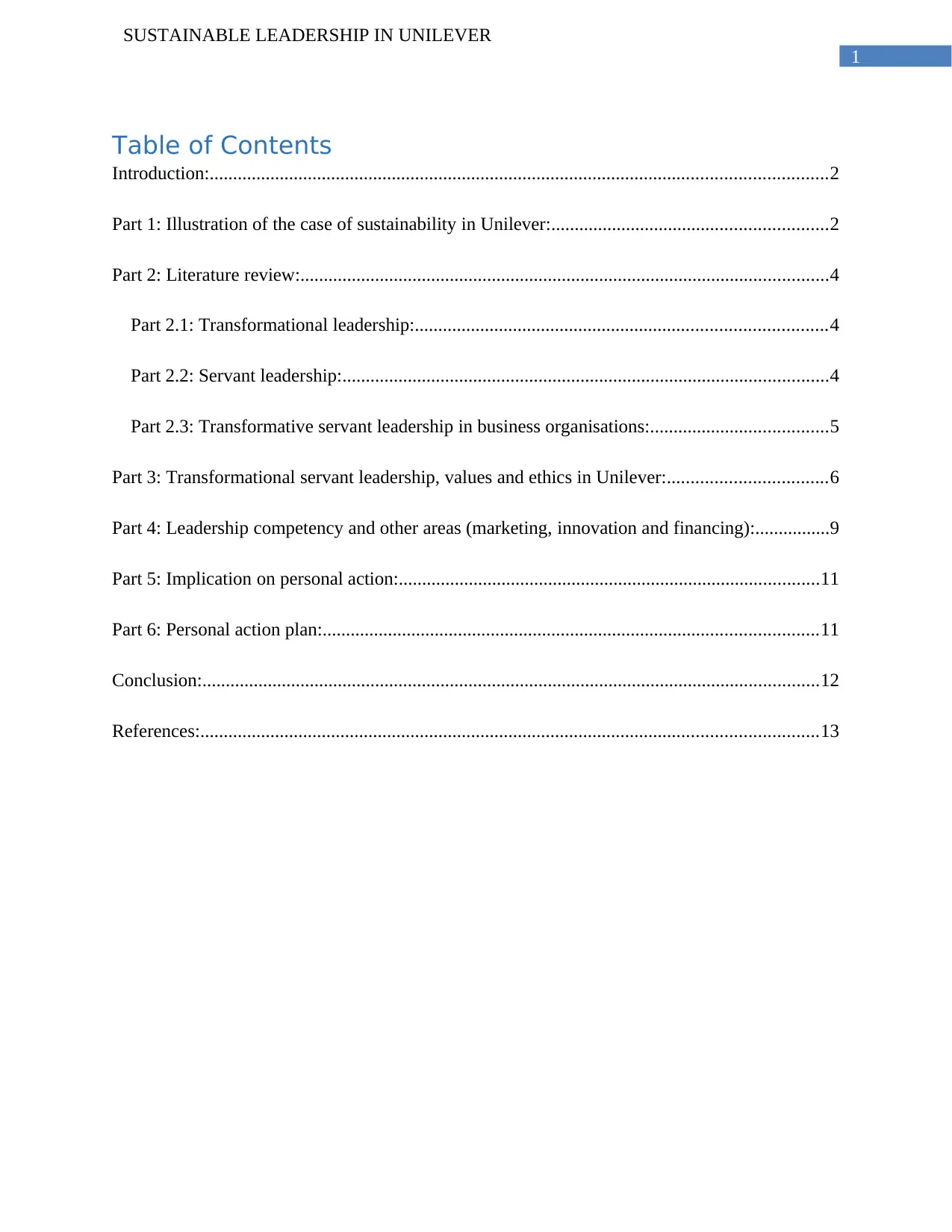
1
SUSTAINABLE LEADERSHIP IN UNILEVER
Table of Contents
Introduction:....................................................................................................................................2
Part 1: Illustration of the case of sustainability in Unilever:...........................................................2
Part 2: Literature review:.................................................................................................................4
Part 2.1: Transformational leadership:........................................................................................4
Part 2.2: Servant leadership:........................................................................................................4
Part 2.3: Transformative servant leadership in business organisations:......................................5
Part 3: Transformational servant leadership, values and ethics in Unilever:..................................6
Part 4: Leadership competency and other areas (marketing, innovation and financing):................9
Part 5: Implication on personal action:..........................................................................................11
Part 6: Personal action plan:..........................................................................................................11
Conclusion:....................................................................................................................................12
References:....................................................................................................................................13
SUSTAINABLE LEADERSHIP IN UNILEVER
Table of Contents
Introduction:....................................................................................................................................2
Part 1: Illustration of the case of sustainability in Unilever:...........................................................2
Part 2: Literature review:.................................................................................................................4
Part 2.1: Transformational leadership:........................................................................................4
Part 2.2: Servant leadership:........................................................................................................4
Part 2.3: Transformative servant leadership in business organisations:......................................5
Part 3: Transformational servant leadership, values and ethics in Unilever:..................................6
Part 4: Leadership competency and other areas (marketing, innovation and financing):................9
Part 5: Implication on personal action:..........................................................................................11
Part 6: Personal action plan:..........................................................................................................11
Conclusion:....................................................................................................................................12
References:....................................................................................................................................13
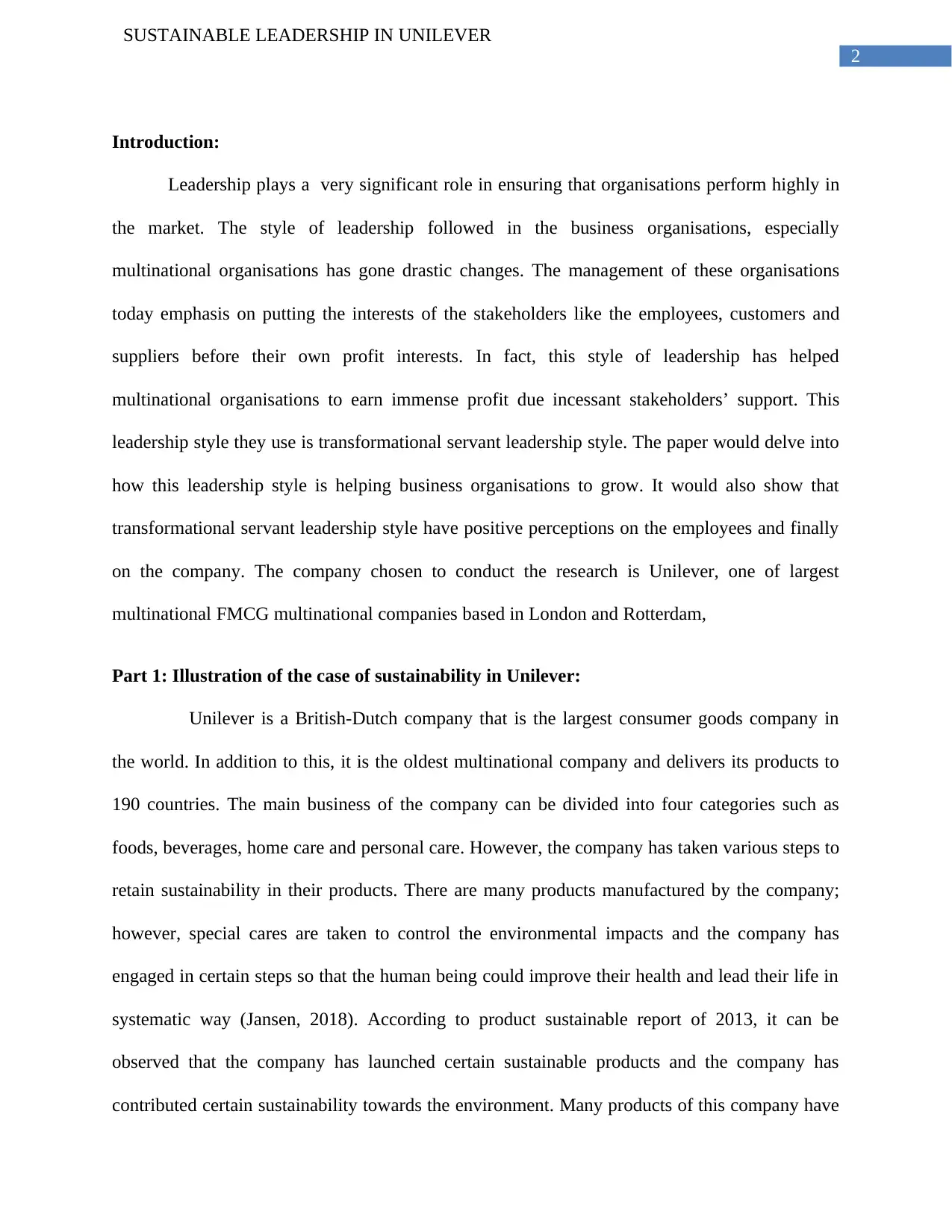
2
SUSTAINABLE LEADERSHIP IN UNILEVER
Introduction:
Leadership plays a very significant role in ensuring that organisations perform highly in
the market. The style of leadership followed in the business organisations, especially
multinational organisations has gone drastic changes. The management of these organisations
today emphasis on putting the interests of the stakeholders like the employees, customers and
suppliers before their own profit interests. In fact, this style of leadership has helped
multinational organisations to earn immense profit due incessant stakeholders’ support. This
leadership style they use is transformational servant leadership style. The paper would delve into
how this leadership style is helping business organisations to grow. It would also show that
transformational servant leadership style have positive perceptions on the employees and finally
on the company. The company chosen to conduct the research is Unilever, one of largest
multinational FMCG multinational companies based in London and Rotterdam,
Part 1: Illustration of the case of sustainability in Unilever:
Unilever is a British-Dutch company that is the largest consumer goods company in
the world. In addition to this, it is the oldest multinational company and delivers its products to
190 countries. The main business of the company can be divided into four categories such as
foods, beverages, home care and personal care. However, the company has taken various steps to
retain sustainability in their products. There are many products manufactured by the company;
however, special cares are taken to control the environmental impacts and the company has
engaged in certain steps so that the human being could improve their health and lead their life in
systematic way (Jansen, 2018). According to product sustainable report of 2013, it can be
observed that the company has launched certain sustainable products and the company has
contributed certain sustainability towards the environment. Many products of this company have
SUSTAINABLE LEADERSHIP IN UNILEVER
Introduction:
Leadership plays a very significant role in ensuring that organisations perform highly in
the market. The style of leadership followed in the business organisations, especially
multinational organisations has gone drastic changes. The management of these organisations
today emphasis on putting the interests of the stakeholders like the employees, customers and
suppliers before their own profit interests. In fact, this style of leadership has helped
multinational organisations to earn immense profit due incessant stakeholders’ support. This
leadership style they use is transformational servant leadership style. The paper would delve into
how this leadership style is helping business organisations to grow. It would also show that
transformational servant leadership style have positive perceptions on the employees and finally
on the company. The company chosen to conduct the research is Unilever, one of largest
multinational FMCG multinational companies based in London and Rotterdam,
Part 1: Illustration of the case of sustainability in Unilever:
Unilever is a British-Dutch company that is the largest consumer goods company in
the world. In addition to this, it is the oldest multinational company and delivers its products to
190 countries. The main business of the company can be divided into four categories such as
foods, beverages, home care and personal care. However, the company has taken various steps to
retain sustainability in their products. There are many products manufactured by the company;
however, special cares are taken to control the environmental impacts and the company has
engaged in certain steps so that the human being could improve their health and lead their life in
systematic way (Jansen, 2018). According to product sustainable report of 2013, it can be
observed that the company has launched certain sustainable products and the company has
contributed certain sustainability towards the environment. Many products of this company have
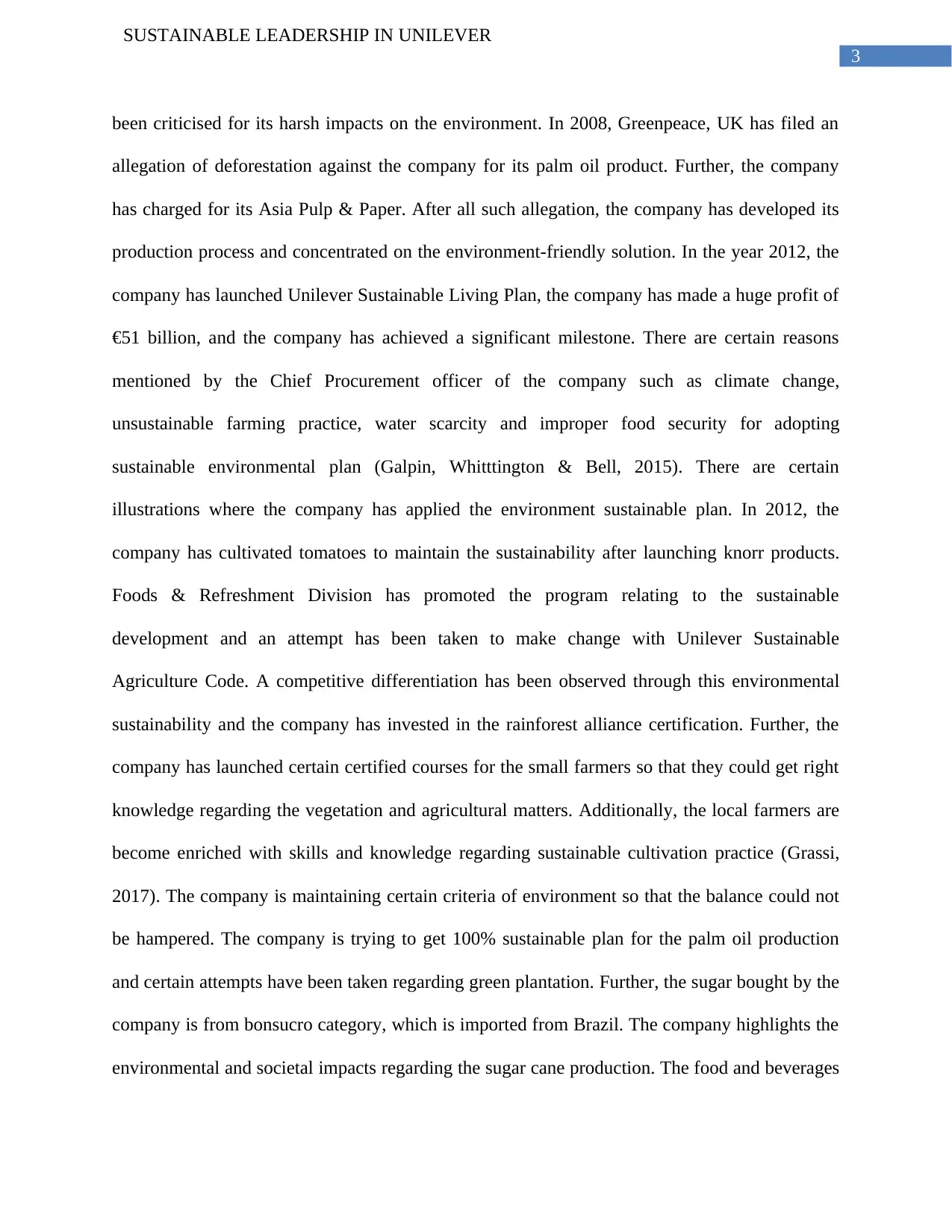
3
SUSTAINABLE LEADERSHIP IN UNILEVER
been criticised for its harsh impacts on the environment. In 2008, Greenpeace, UK has filed an
allegation of deforestation against the company for its palm oil product. Further, the company
has charged for its Asia Pulp & Paper. After all such allegation, the company has developed its
production process and concentrated on the environment-friendly solution. In the year 2012, the
company has launched Unilever Sustainable Living Plan, the company has made a huge profit of
€51 billion, and the company has achieved a significant milestone. There are certain reasons
mentioned by the Chief Procurement officer of the company such as climate change,
unsustainable farming practice, water scarcity and improper food security for adopting
sustainable environmental plan (Galpin, Whitttington & Bell, 2015). There are certain
illustrations where the company has applied the environment sustainable plan. In 2012, the
company has cultivated tomatoes to maintain the sustainability after launching knorr products.
Foods & Refreshment Division has promoted the program relating to the sustainable
development and an attempt has been taken to make change with Unilever Sustainable
Agriculture Code. A competitive differentiation has been observed through this environmental
sustainability and the company has invested in the rainforest alliance certification. Further, the
company has launched certain certified courses for the small farmers so that they could get right
knowledge regarding the vegetation and agricultural matters. Additionally, the local farmers are
become enriched with skills and knowledge regarding sustainable cultivation practice (Grassi,
2017). The company is maintaining certain criteria of environment so that the balance could not
be hampered. The company is trying to get 100% sustainable plan for the palm oil production
and certain attempts have been taken regarding green plantation. Further, the sugar bought by the
company is from bonsucro category, which is imported from Brazil. The company highlights the
environmental and societal impacts regarding the sugar cane production. The food and beverages
SUSTAINABLE LEADERSHIP IN UNILEVER
been criticised for its harsh impacts on the environment. In 2008, Greenpeace, UK has filed an
allegation of deforestation against the company for its palm oil product. Further, the company
has charged for its Asia Pulp & Paper. After all such allegation, the company has developed its
production process and concentrated on the environment-friendly solution. In the year 2012, the
company has launched Unilever Sustainable Living Plan, the company has made a huge profit of
€51 billion, and the company has achieved a significant milestone. There are certain reasons
mentioned by the Chief Procurement officer of the company such as climate change,
unsustainable farming practice, water scarcity and improper food security for adopting
sustainable environmental plan (Galpin, Whitttington & Bell, 2015). There are certain
illustrations where the company has applied the environment sustainable plan. In 2012, the
company has cultivated tomatoes to maintain the sustainability after launching knorr products.
Foods & Refreshment Division has promoted the program relating to the sustainable
development and an attempt has been taken to make change with Unilever Sustainable
Agriculture Code. A competitive differentiation has been observed through this environmental
sustainability and the company has invested in the rainforest alliance certification. Further, the
company has launched certain certified courses for the small farmers so that they could get right
knowledge regarding the vegetation and agricultural matters. Additionally, the local farmers are
become enriched with skills and knowledge regarding sustainable cultivation practice (Grassi,
2017). The company is maintaining certain criteria of environment so that the balance could not
be hampered. The company is trying to get 100% sustainable plan for the palm oil production
and certain attempts have been taken regarding green plantation. Further, the sugar bought by the
company is from bonsucro category, which is imported from Brazil. The company highlights the
environmental and societal impacts regarding the sugar cane production. The food and beverages
Secure Best Marks with AI Grader
Need help grading? Try our AI Grader for instant feedback on your assignments.
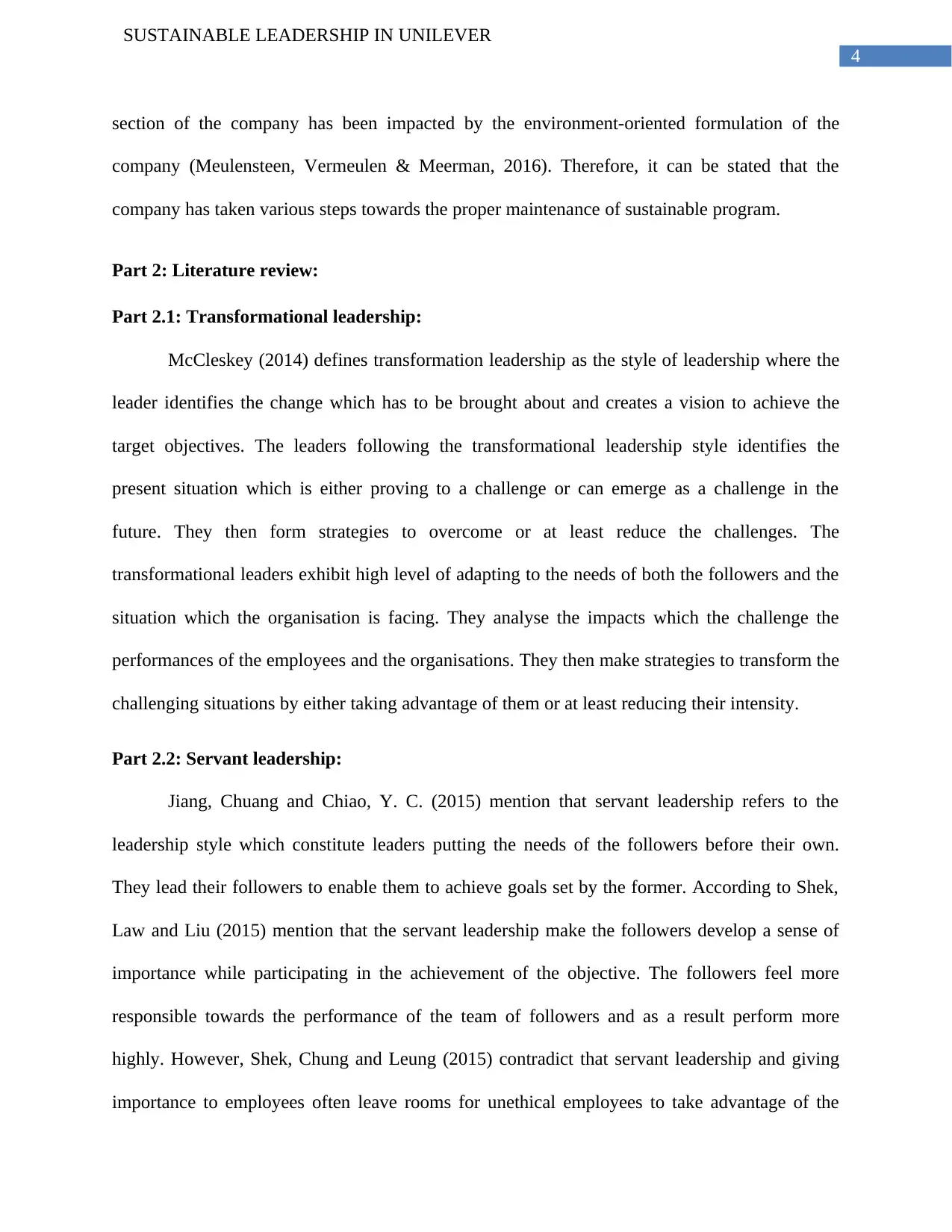
4
SUSTAINABLE LEADERSHIP IN UNILEVER
section of the company has been impacted by the environment-oriented formulation of the
company (Meulensteen, Vermeulen & Meerman, 2016). Therefore, it can be stated that the
company has taken various steps towards the proper maintenance of sustainable program.
Part 2: Literature review:
Part 2.1: Transformational leadership:
McCleskey (2014) defines transformation leadership as the style of leadership where the
leader identifies the change which has to be brought about and creates a vision to achieve the
target objectives. The leaders following the transformational leadership style identifies the
present situation which is either proving to a challenge or can emerge as a challenge in the
future. They then form strategies to overcome or at least reduce the challenges. The
transformational leaders exhibit high level of adapting to the needs of both the followers and the
situation which the organisation is facing. They analyse the impacts which the challenge the
performances of the employees and the organisations. They then make strategies to transform the
challenging situations by either taking advantage of them or at least reducing their intensity.
Part 2.2: Servant leadership:
Jiang, Chuang and Chiao, Y. C. (2015) mention that servant leadership refers to the
leadership style which constitute leaders putting the needs of the followers before their own.
They lead their followers to enable them to achieve goals set by the former. According to Shek,
Law and Liu (2015) mention that the servant leadership make the followers develop a sense of
importance while participating in the achievement of the objective. The followers feel more
responsible towards the performance of the team of followers and as a result perform more
highly. However, Shek, Chung and Leung (2015) contradict that servant leadership and giving
importance to employees often leave rooms for unethical employees to take advantage of the
SUSTAINABLE LEADERSHIP IN UNILEVER
section of the company has been impacted by the environment-oriented formulation of the
company (Meulensteen, Vermeulen & Meerman, 2016). Therefore, it can be stated that the
company has taken various steps towards the proper maintenance of sustainable program.
Part 2: Literature review:
Part 2.1: Transformational leadership:
McCleskey (2014) defines transformation leadership as the style of leadership where the
leader identifies the change which has to be brought about and creates a vision to achieve the
target objectives. The leaders following the transformational leadership style identifies the
present situation which is either proving to a challenge or can emerge as a challenge in the
future. They then form strategies to overcome or at least reduce the challenges. The
transformational leaders exhibit high level of adapting to the needs of both the followers and the
situation which the organisation is facing. They analyse the impacts which the challenge the
performances of the employees and the organisations. They then make strategies to transform the
challenging situations by either taking advantage of them or at least reducing their intensity.
Part 2.2: Servant leadership:
Jiang, Chuang and Chiao, Y. C. (2015) mention that servant leadership refers to the
leadership style which constitute leaders putting the needs of the followers before their own.
They lead their followers to enable them to achieve goals set by the former. According to Shek,
Law and Liu (2015) mention that the servant leadership make the followers develop a sense of
importance while participating in the achievement of the objective. The followers feel more
responsible towards the performance of the team of followers and as a result perform more
highly. However, Shek, Chung and Leung (2015) contradict that servant leadership and giving
importance to employees often leave rooms for unethical employees to take advantage of the
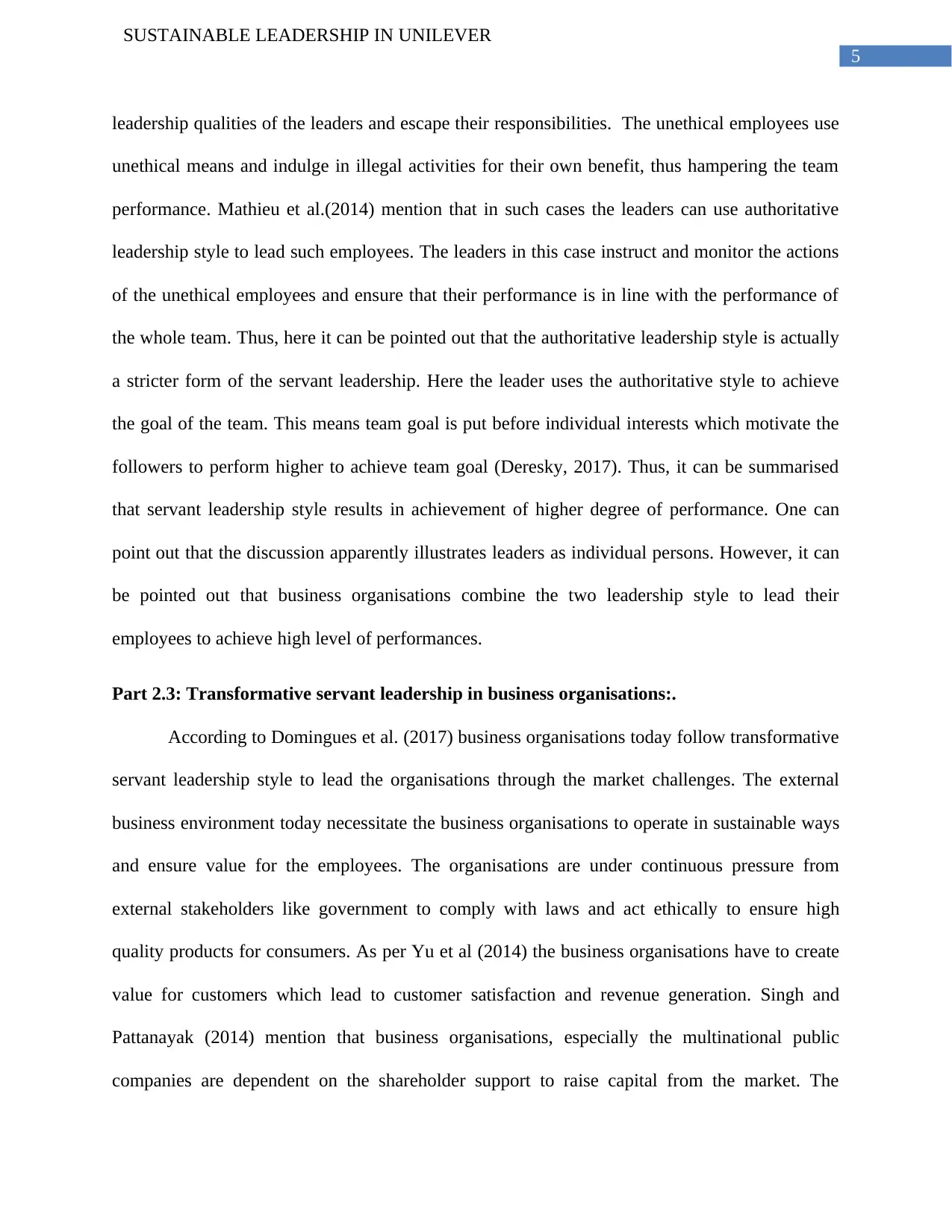
5
SUSTAINABLE LEADERSHIP IN UNILEVER
leadership qualities of the leaders and escape their responsibilities. The unethical employees use
unethical means and indulge in illegal activities for their own benefit, thus hampering the team
performance. Mathieu et al.(2014) mention that in such cases the leaders can use authoritative
leadership style to lead such employees. The leaders in this case instruct and monitor the actions
of the unethical employees and ensure that their performance is in line with the performance of
the whole team. Thus, here it can be pointed out that the authoritative leadership style is actually
a stricter form of the servant leadership. Here the leader uses the authoritative style to achieve
the goal of the team. This means team goal is put before individual interests which motivate the
followers to perform higher to achieve team goal (Deresky, 2017). Thus, it can be summarised
that servant leadership style results in achievement of higher degree of performance. One can
point out that the discussion apparently illustrates leaders as individual persons. However, it can
be pointed out that business organisations combine the two leadership style to lead their
employees to achieve high level of performances.
Part 2.3: Transformative servant leadership in business organisations:.
According to Domingues et al. (2017) business organisations today follow transformative
servant leadership style to lead the organisations through the market challenges. The external
business environment today necessitate the business organisations to operate in sustainable ways
and ensure value for the employees. The organisations are under continuous pressure from
external stakeholders like government to comply with laws and act ethically to ensure high
quality products for consumers. As per Yu et al (2014) the business organisations have to create
value for customers which lead to customer satisfaction and revenue generation. Singh and
Pattanayak (2014) mention that business organisations, especially the multinational public
companies are dependent on the shareholder support to raise capital from the market. The
SUSTAINABLE LEADERSHIP IN UNILEVER
leadership qualities of the leaders and escape their responsibilities. The unethical employees use
unethical means and indulge in illegal activities for their own benefit, thus hampering the team
performance. Mathieu et al.(2014) mention that in such cases the leaders can use authoritative
leadership style to lead such employees. The leaders in this case instruct and monitor the actions
of the unethical employees and ensure that their performance is in line with the performance of
the whole team. Thus, here it can be pointed out that the authoritative leadership style is actually
a stricter form of the servant leadership. Here the leader uses the authoritative style to achieve
the goal of the team. This means team goal is put before individual interests which motivate the
followers to perform higher to achieve team goal (Deresky, 2017). Thus, it can be summarised
that servant leadership style results in achievement of higher degree of performance. One can
point out that the discussion apparently illustrates leaders as individual persons. However, it can
be pointed out that business organisations combine the two leadership style to lead their
employees to achieve high level of performances.
Part 2.3: Transformative servant leadership in business organisations:.
According to Domingues et al. (2017) business organisations today follow transformative
servant leadership style to lead the organisations through the market challenges. The external
business environment today necessitate the business organisations to operate in sustainable ways
and ensure value for the employees. The organisations are under continuous pressure from
external stakeholders like government to comply with laws and act ethically to ensure high
quality products for consumers. As per Yu et al (2014) the business organisations have to create
value for customers which lead to customer satisfaction and revenue generation. Singh and
Pattanayak (2014) mention that business organisations, especially the multinational public
companies are dependent on the shareholder support to raise capital from the market. The
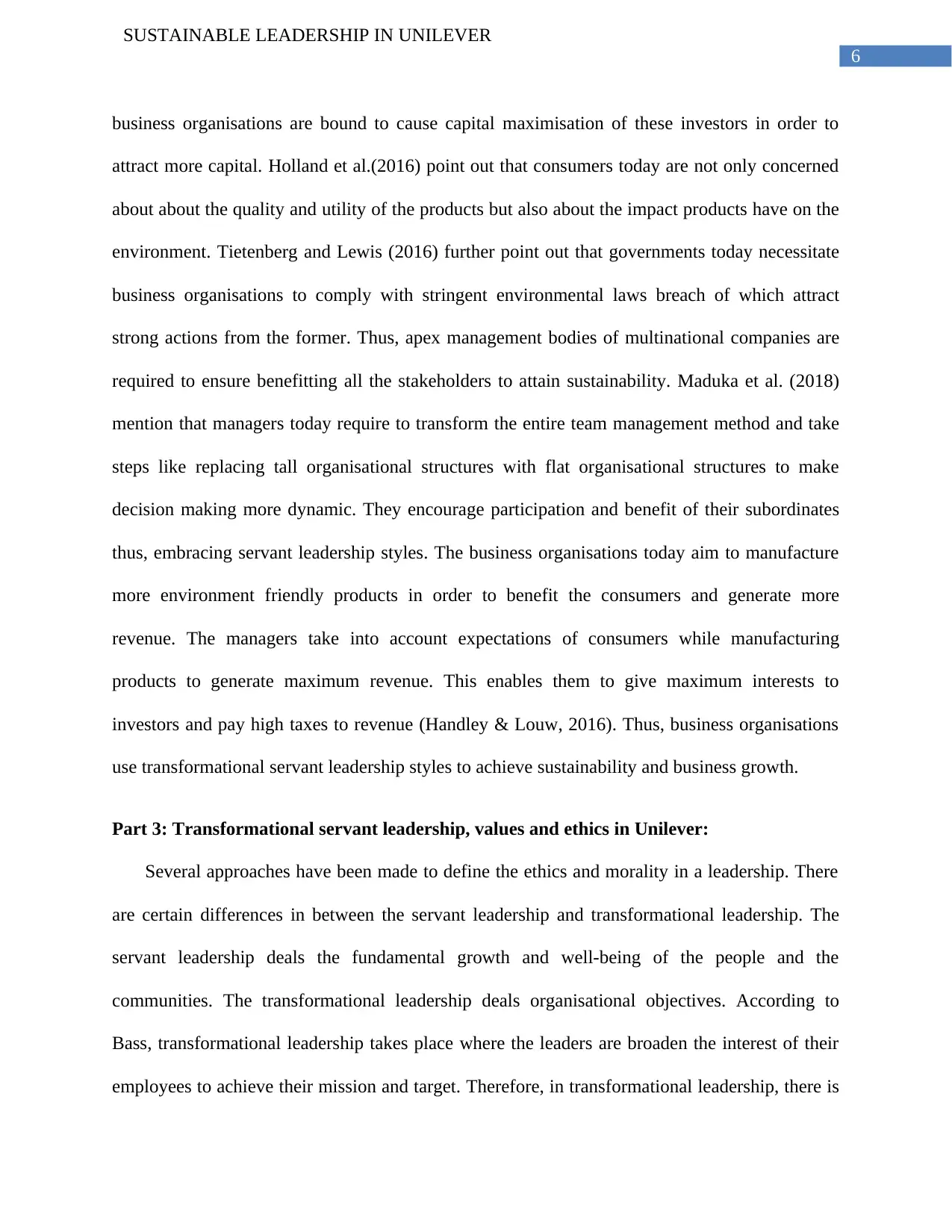
6
SUSTAINABLE LEADERSHIP IN UNILEVER
business organisations are bound to cause capital maximisation of these investors in order to
attract more capital. Holland et al.(2016) point out that consumers today are not only concerned
about about the quality and utility of the products but also about the impact products have on the
environment. Tietenberg and Lewis (2016) further point out that governments today necessitate
business organisations to comply with stringent environmental laws breach of which attract
strong actions from the former. Thus, apex management bodies of multinational companies are
required to ensure benefitting all the stakeholders to attain sustainability. Maduka et al. (2018)
mention that managers today require to transform the entire team management method and take
steps like replacing tall organisational structures with flat organisational structures to make
decision making more dynamic. They encourage participation and benefit of their subordinates
thus, embracing servant leadership styles. The business organisations today aim to manufacture
more environment friendly products in order to benefit the consumers and generate more
revenue. The managers take into account expectations of consumers while manufacturing
products to generate maximum revenue. This enables them to give maximum interests to
investors and pay high taxes to revenue (Handley & Louw, 2016). Thus, business organisations
use transformational servant leadership styles to achieve sustainability and business growth.
Part 3: Transformational servant leadership, values and ethics in Unilever:
Several approaches have been made to define the ethics and morality in a leadership. There
are certain differences in between the servant leadership and transformational leadership. The
servant leadership deals the fundamental growth and well-being of the people and the
communities. The transformational leadership deals organisational objectives. According to
Bass, transformational leadership takes place where the leaders are broaden the interest of their
employees to achieve their mission and target. Therefore, in transformational leadership, there is
SUSTAINABLE LEADERSHIP IN UNILEVER
business organisations are bound to cause capital maximisation of these investors in order to
attract more capital. Holland et al.(2016) point out that consumers today are not only concerned
about about the quality and utility of the products but also about the impact products have on the
environment. Tietenberg and Lewis (2016) further point out that governments today necessitate
business organisations to comply with stringent environmental laws breach of which attract
strong actions from the former. Thus, apex management bodies of multinational companies are
required to ensure benefitting all the stakeholders to attain sustainability. Maduka et al. (2018)
mention that managers today require to transform the entire team management method and take
steps like replacing tall organisational structures with flat organisational structures to make
decision making more dynamic. They encourage participation and benefit of their subordinates
thus, embracing servant leadership styles. The business organisations today aim to manufacture
more environment friendly products in order to benefit the consumers and generate more
revenue. The managers take into account expectations of consumers while manufacturing
products to generate maximum revenue. This enables them to give maximum interests to
investors and pay high taxes to revenue (Handley & Louw, 2016). Thus, business organisations
use transformational servant leadership styles to achieve sustainability and business growth.
Part 3: Transformational servant leadership, values and ethics in Unilever:
Several approaches have been made to define the ethics and morality in a leadership. There
are certain differences in between the servant leadership and transformational leadership. The
servant leadership deals the fundamental growth and well-being of the people and the
communities. The transformational leadership deals organisational objectives. According to
Bass, transformational leadership takes place where the leaders are broaden the interest of their
employees to achieve their mission and target. Therefore, in transformational leadership, there is
Paraphrase This Document
Need a fresh take? Get an instant paraphrase of this document with our AI Paraphraser
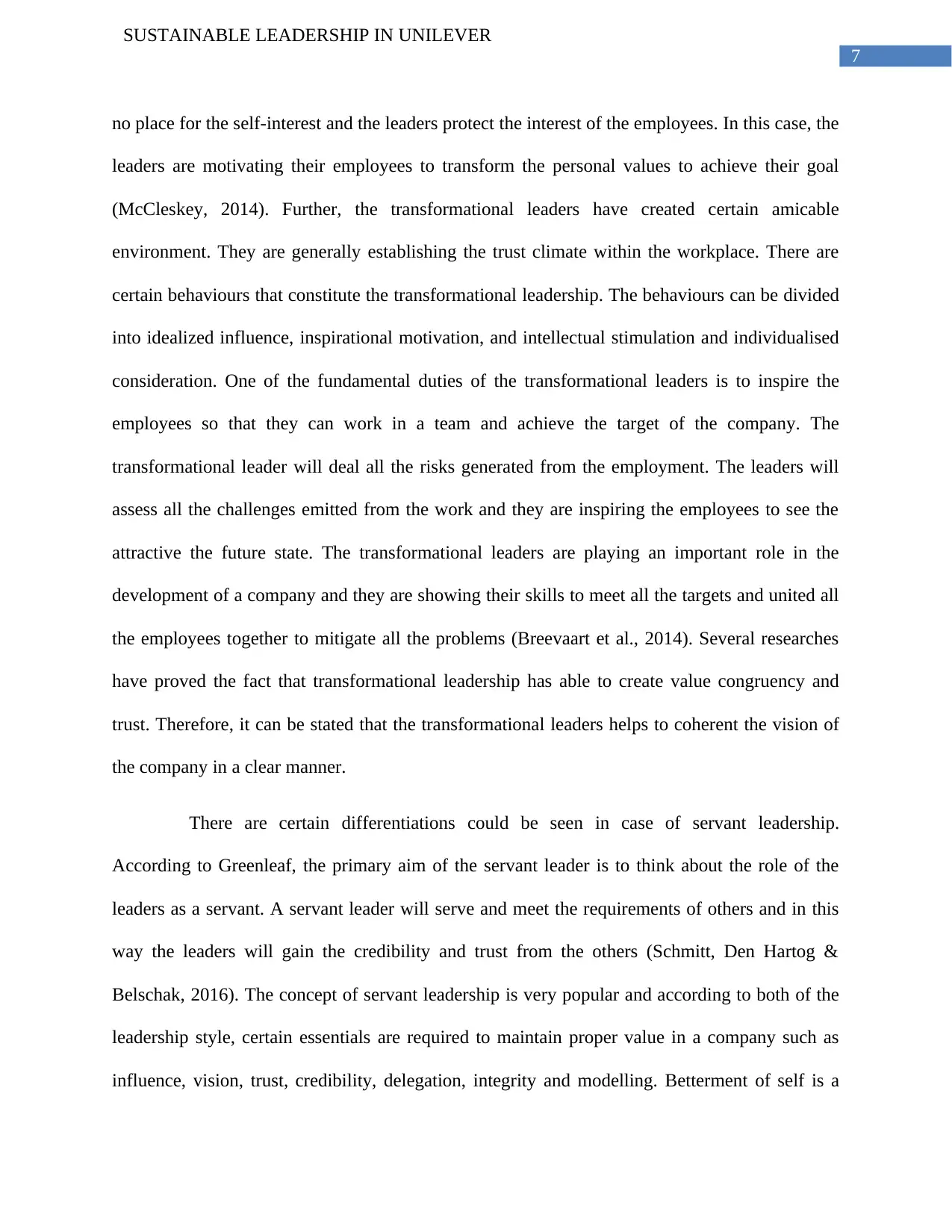
7
SUSTAINABLE LEADERSHIP IN UNILEVER
no place for the self-interest and the leaders protect the interest of the employees. In this case, the
leaders are motivating their employees to transform the personal values to achieve their goal
(McCleskey, 2014). Further, the transformational leaders have created certain amicable
environment. They are generally establishing the trust climate within the workplace. There are
certain behaviours that constitute the transformational leadership. The behaviours can be divided
into idealized influence, inspirational motivation, and intellectual stimulation and individualised
consideration. One of the fundamental duties of the transformational leaders is to inspire the
employees so that they can work in a team and achieve the target of the company. The
transformational leader will deal all the risks generated from the employment. The leaders will
assess all the challenges emitted from the work and they are inspiring the employees to see the
attractive the future state. The transformational leaders are playing an important role in the
development of a company and they are showing their skills to meet all the targets and united all
the employees together to mitigate all the problems (Breevaart et al., 2014). Several researches
have proved the fact that transformational leadership has able to create value congruency and
trust. Therefore, it can be stated that the transformational leaders helps to coherent the vision of
the company in a clear manner.
There are certain differentiations could be seen in case of servant leadership.
According to Greenleaf, the primary aim of the servant leader is to think about the role of the
leaders as a servant. A servant leader will serve and meet the requirements of others and in this
way the leaders will gain the credibility and trust from the others (Schmitt, Den Hartog &
Belschak, 2016). The concept of servant leadership is very popular and according to both of the
leadership style, certain essentials are required to maintain proper value in a company such as
influence, vision, trust, credibility, delegation, integrity and modelling. Betterment of self is a
SUSTAINABLE LEADERSHIP IN UNILEVER
no place for the self-interest and the leaders protect the interest of the employees. In this case, the
leaders are motivating their employees to transform the personal values to achieve their goal
(McCleskey, 2014). Further, the transformational leaders have created certain amicable
environment. They are generally establishing the trust climate within the workplace. There are
certain behaviours that constitute the transformational leadership. The behaviours can be divided
into idealized influence, inspirational motivation, and intellectual stimulation and individualised
consideration. One of the fundamental duties of the transformational leaders is to inspire the
employees so that they can work in a team and achieve the target of the company. The
transformational leader will deal all the risks generated from the employment. The leaders will
assess all the challenges emitted from the work and they are inspiring the employees to see the
attractive the future state. The transformational leaders are playing an important role in the
development of a company and they are showing their skills to meet all the targets and united all
the employees together to mitigate all the problems (Breevaart et al., 2014). Several researches
have proved the fact that transformational leadership has able to create value congruency and
trust. Therefore, it can be stated that the transformational leaders helps to coherent the vision of
the company in a clear manner.
There are certain differentiations could be seen in case of servant leadership.
According to Greenleaf, the primary aim of the servant leader is to think about the role of the
leaders as a servant. A servant leader will serve and meet the requirements of others and in this
way the leaders will gain the credibility and trust from the others (Schmitt, Den Hartog &
Belschak, 2016). The concept of servant leadership is very popular and according to both of the
leadership style, certain essentials are required to maintain proper value in a company such as
influence, vision, trust, credibility, delegation, integrity and modelling. Betterment of self is a
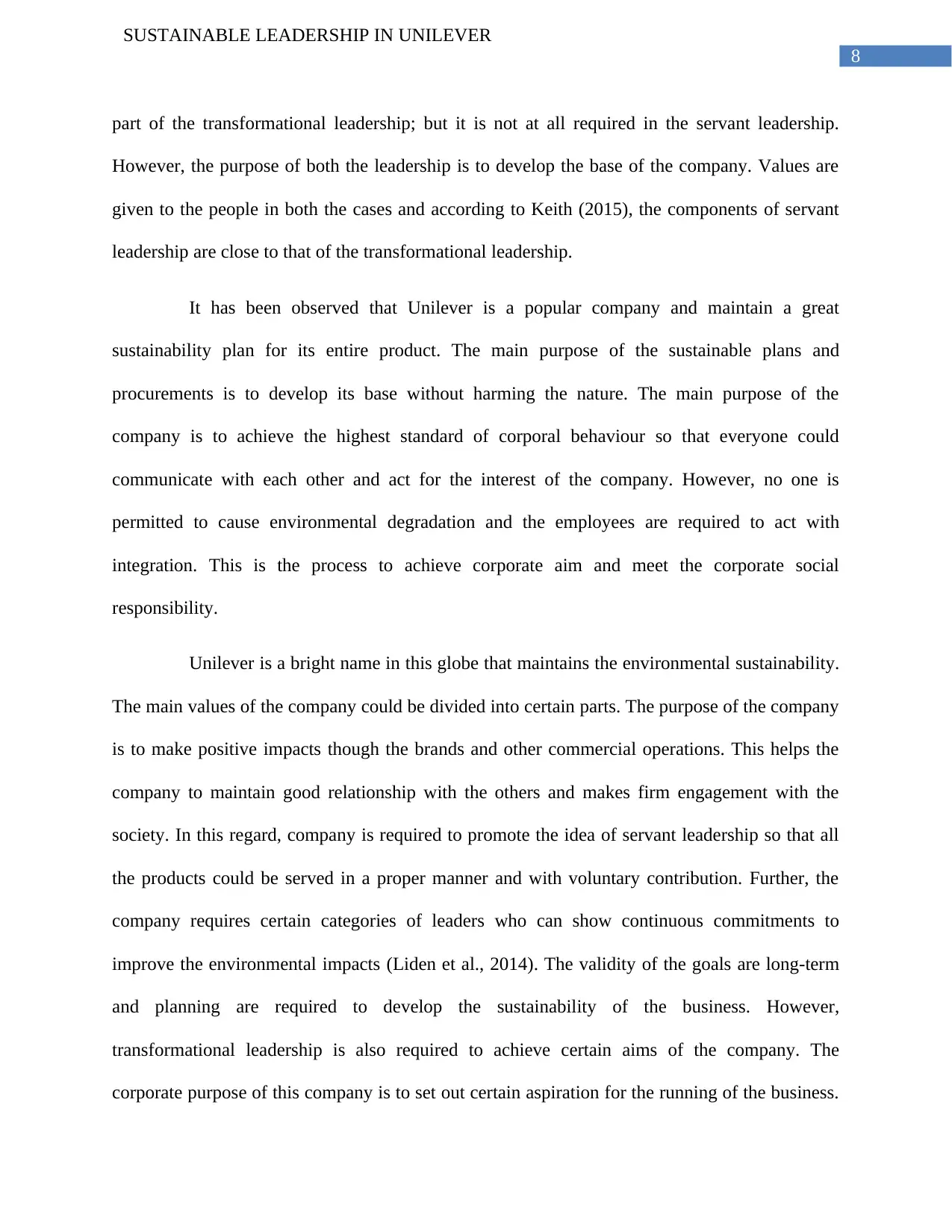
8
SUSTAINABLE LEADERSHIP IN UNILEVER
part of the transformational leadership; but it is not at all required in the servant leadership.
However, the purpose of both the leadership is to develop the base of the company. Values are
given to the people in both the cases and according to Keith (2015), the components of servant
leadership are close to that of the transformational leadership.
It has been observed that Unilever is a popular company and maintain a great
sustainability plan for its entire product. The main purpose of the sustainable plans and
procurements is to develop its base without harming the nature. The main purpose of the
company is to achieve the highest standard of corporal behaviour so that everyone could
communicate with each other and act for the interest of the company. However, no one is
permitted to cause environmental degradation and the employees are required to act with
integration. This is the process to achieve corporate aim and meet the corporate social
responsibility.
Unilever is a bright name in this globe that maintains the environmental sustainability.
The main values of the company could be divided into certain parts. The purpose of the company
is to make positive impacts though the brands and other commercial operations. This helps the
company to maintain good relationship with the others and makes firm engagement with the
society. In this regard, company is required to promote the idea of servant leadership so that all
the products could be served in a proper manner and with voluntary contribution. Further, the
company requires certain categories of leaders who can show continuous commitments to
improve the environmental impacts (Liden et al., 2014). The validity of the goals are long-term
and planning are required to develop the sustainability of the business. However,
transformational leadership is also required to achieve certain aims of the company. The
corporate purpose of this company is to set out certain aspiration for the running of the business.
SUSTAINABLE LEADERSHIP IN UNILEVER
part of the transformational leadership; but it is not at all required in the servant leadership.
However, the purpose of both the leadership is to develop the base of the company. Values are
given to the people in both the cases and according to Keith (2015), the components of servant
leadership are close to that of the transformational leadership.
It has been observed that Unilever is a popular company and maintain a great
sustainability plan for its entire product. The main purpose of the sustainable plans and
procurements is to develop its base without harming the nature. The main purpose of the
company is to achieve the highest standard of corporal behaviour so that everyone could
communicate with each other and act for the interest of the company. However, no one is
permitted to cause environmental degradation and the employees are required to act with
integration. This is the process to achieve corporate aim and meet the corporate social
responsibility.
Unilever is a bright name in this globe that maintains the environmental sustainability.
The main values of the company could be divided into certain parts. The purpose of the company
is to make positive impacts though the brands and other commercial operations. This helps the
company to maintain good relationship with the others and makes firm engagement with the
society. In this regard, company is required to promote the idea of servant leadership so that all
the products could be served in a proper manner and with voluntary contribution. Further, the
company requires certain categories of leaders who can show continuous commitments to
improve the environmental impacts (Liden et al., 2014). The validity of the goals are long-term
and planning are required to develop the sustainability of the business. However,
transformational leadership is also required to achieve certain aims of the company. The
corporate purpose of this company is to set out certain aspiration for the running of the business.
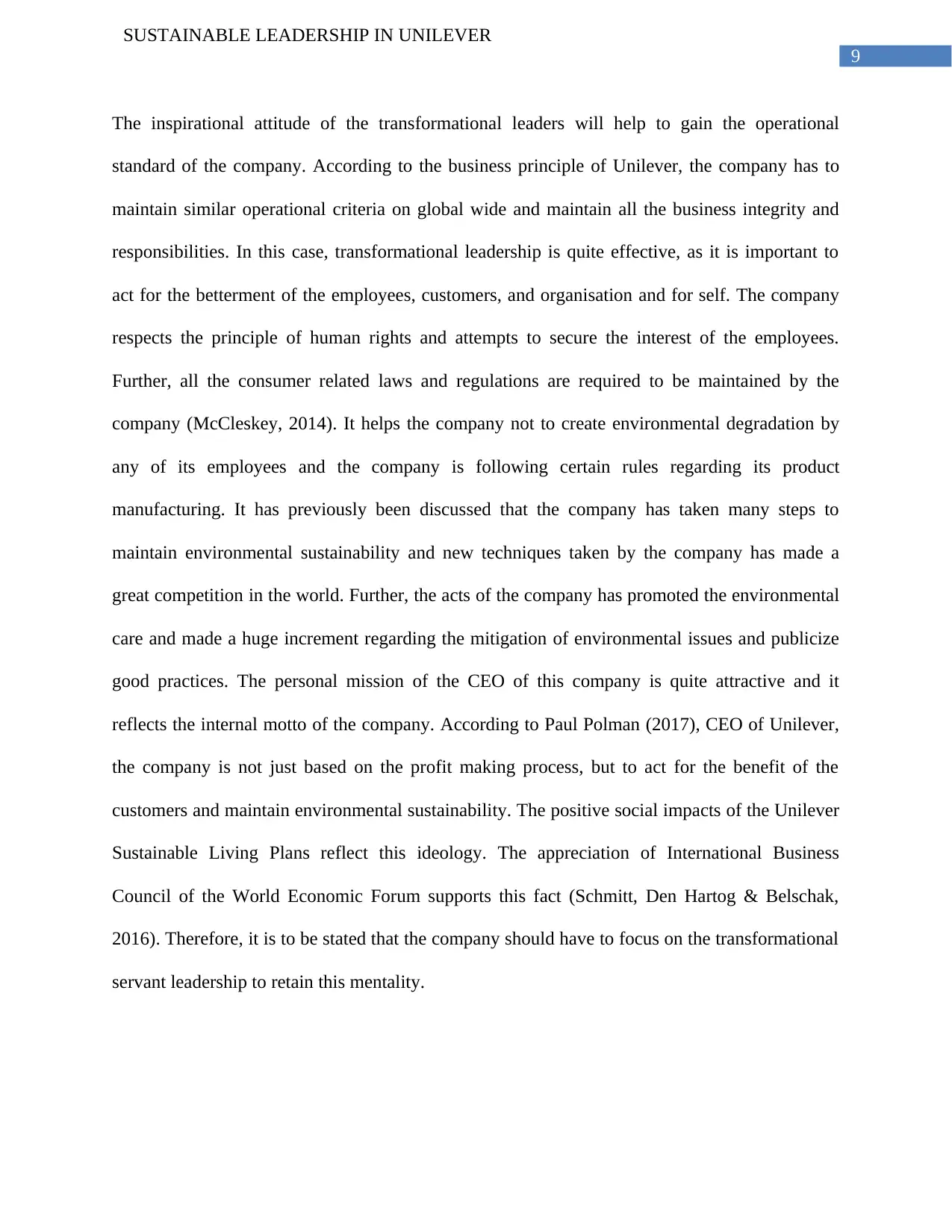
9
SUSTAINABLE LEADERSHIP IN UNILEVER
The inspirational attitude of the transformational leaders will help to gain the operational
standard of the company. According to the business principle of Unilever, the company has to
maintain similar operational criteria on global wide and maintain all the business integrity and
responsibilities. In this case, transformational leadership is quite effective, as it is important to
act for the betterment of the employees, customers, and organisation and for self. The company
respects the principle of human rights and attempts to secure the interest of the employees.
Further, all the consumer related laws and regulations are required to be maintained by the
company (McCleskey, 2014). It helps the company not to create environmental degradation by
any of its employees and the company is following certain rules regarding its product
manufacturing. It has previously been discussed that the company has taken many steps to
maintain environmental sustainability and new techniques taken by the company has made a
great competition in the world. Further, the acts of the company has promoted the environmental
care and made a huge increment regarding the mitigation of environmental issues and publicize
good practices. The personal mission of the CEO of this company is quite attractive and it
reflects the internal motto of the company. According to Paul Polman (2017), CEO of Unilever,
the company is not just based on the profit making process, but to act for the benefit of the
customers and maintain environmental sustainability. The positive social impacts of the Unilever
Sustainable Living Plans reflect this ideology. The appreciation of International Business
Council of the World Economic Forum supports this fact (Schmitt, Den Hartog & Belschak,
2016). Therefore, it is to be stated that the company should have to focus on the transformational
servant leadership to retain this mentality.
SUSTAINABLE LEADERSHIP IN UNILEVER
The inspirational attitude of the transformational leaders will help to gain the operational
standard of the company. According to the business principle of Unilever, the company has to
maintain similar operational criteria on global wide and maintain all the business integrity and
responsibilities. In this case, transformational leadership is quite effective, as it is important to
act for the betterment of the employees, customers, and organisation and for self. The company
respects the principle of human rights and attempts to secure the interest of the employees.
Further, all the consumer related laws and regulations are required to be maintained by the
company (McCleskey, 2014). It helps the company not to create environmental degradation by
any of its employees and the company is following certain rules regarding its product
manufacturing. It has previously been discussed that the company has taken many steps to
maintain environmental sustainability and new techniques taken by the company has made a
great competition in the world. Further, the acts of the company has promoted the environmental
care and made a huge increment regarding the mitigation of environmental issues and publicize
good practices. The personal mission of the CEO of this company is quite attractive and it
reflects the internal motto of the company. According to Paul Polman (2017), CEO of Unilever,
the company is not just based on the profit making process, but to act for the benefit of the
customers and maintain environmental sustainability. The positive social impacts of the Unilever
Sustainable Living Plans reflect this ideology. The appreciation of International Business
Council of the World Economic Forum supports this fact (Schmitt, Den Hartog & Belschak,
2016). Therefore, it is to be stated that the company should have to focus on the transformational
servant leadership to retain this mentality.
Secure Best Marks with AI Grader
Need help grading? Try our AI Grader for instant feedback on your assignments.
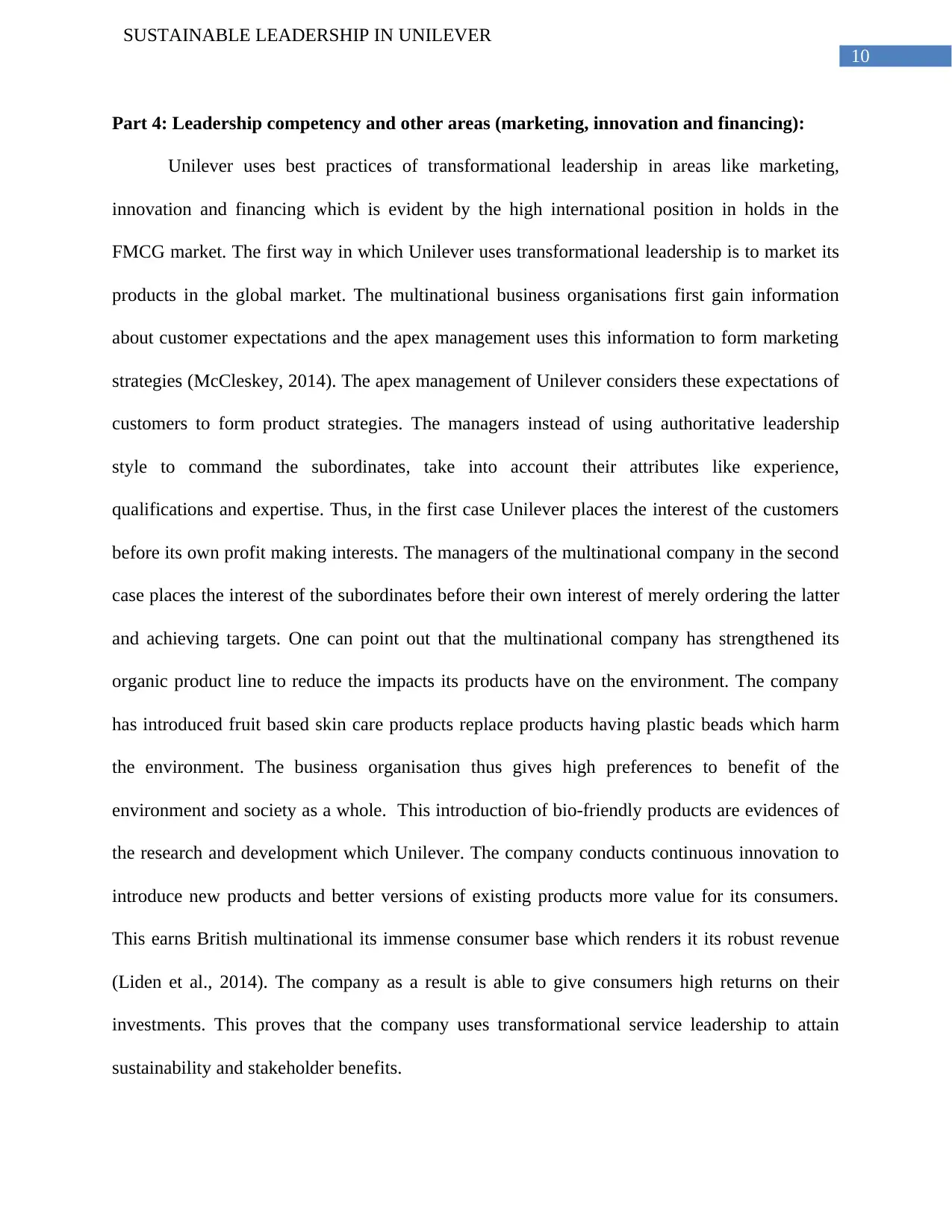
10
SUSTAINABLE LEADERSHIP IN UNILEVER
Part 4: Leadership competency and other areas (marketing, innovation and financing):
Unilever uses best practices of transformational leadership in areas like marketing,
innovation and financing which is evident by the high international position in holds in the
FMCG market. The first way in which Unilever uses transformational leadership is to market its
products in the global market. The multinational business organisations first gain information
about customer expectations and the apex management uses this information to form marketing
strategies (McCleskey, 2014). The apex management of Unilever considers these expectations of
customers to form product strategies. The managers instead of using authoritative leadership
style to command the subordinates, take into account their attributes like experience,
qualifications and expertise. Thus, in the first case Unilever places the interest of the customers
before its own profit making interests. The managers of the multinational company in the second
case places the interest of the subordinates before their own interest of merely ordering the latter
and achieving targets. One can point out that the multinational company has strengthened its
organic product line to reduce the impacts its products have on the environment. The company
has introduced fruit based skin care products replace products having plastic beads which harm
the environment. The business organisation thus gives high preferences to benefit of the
environment and society as a whole. This introduction of bio-friendly products are evidences of
the research and development which Unilever. The company conducts continuous innovation to
introduce new products and better versions of existing products more value for its consumers.
This earns British multinational its immense consumer base which renders it its robust revenue
(Liden et al., 2014). The company as a result is able to give consumers high returns on their
investments. This proves that the company uses transformational service leadership to attain
sustainability and stakeholder benefits.
SUSTAINABLE LEADERSHIP IN UNILEVER
Part 4: Leadership competency and other areas (marketing, innovation and financing):
Unilever uses best practices of transformational leadership in areas like marketing,
innovation and financing which is evident by the high international position in holds in the
FMCG market. The first way in which Unilever uses transformational leadership is to market its
products in the global market. The multinational business organisations first gain information
about customer expectations and the apex management uses this information to form marketing
strategies (McCleskey, 2014). The apex management of Unilever considers these expectations of
customers to form product strategies. The managers instead of using authoritative leadership
style to command the subordinates, take into account their attributes like experience,
qualifications and expertise. Thus, in the first case Unilever places the interest of the customers
before its own profit making interests. The managers of the multinational company in the second
case places the interest of the subordinates before their own interest of merely ordering the latter
and achieving targets. One can point out that the multinational company has strengthened its
organic product line to reduce the impacts its products have on the environment. The company
has introduced fruit based skin care products replace products having plastic beads which harm
the environment. The business organisation thus gives high preferences to benefit of the
environment and society as a whole. This introduction of bio-friendly products are evidences of
the research and development which Unilever. The company conducts continuous innovation to
introduce new products and better versions of existing products more value for its consumers.
This earns British multinational its immense consumer base which renders it its robust revenue
(Liden et al., 2014). The company as a result is able to give consumers high returns on their
investments. This proves that the company uses transformational service leadership to attain
sustainability and stakeholder benefits.
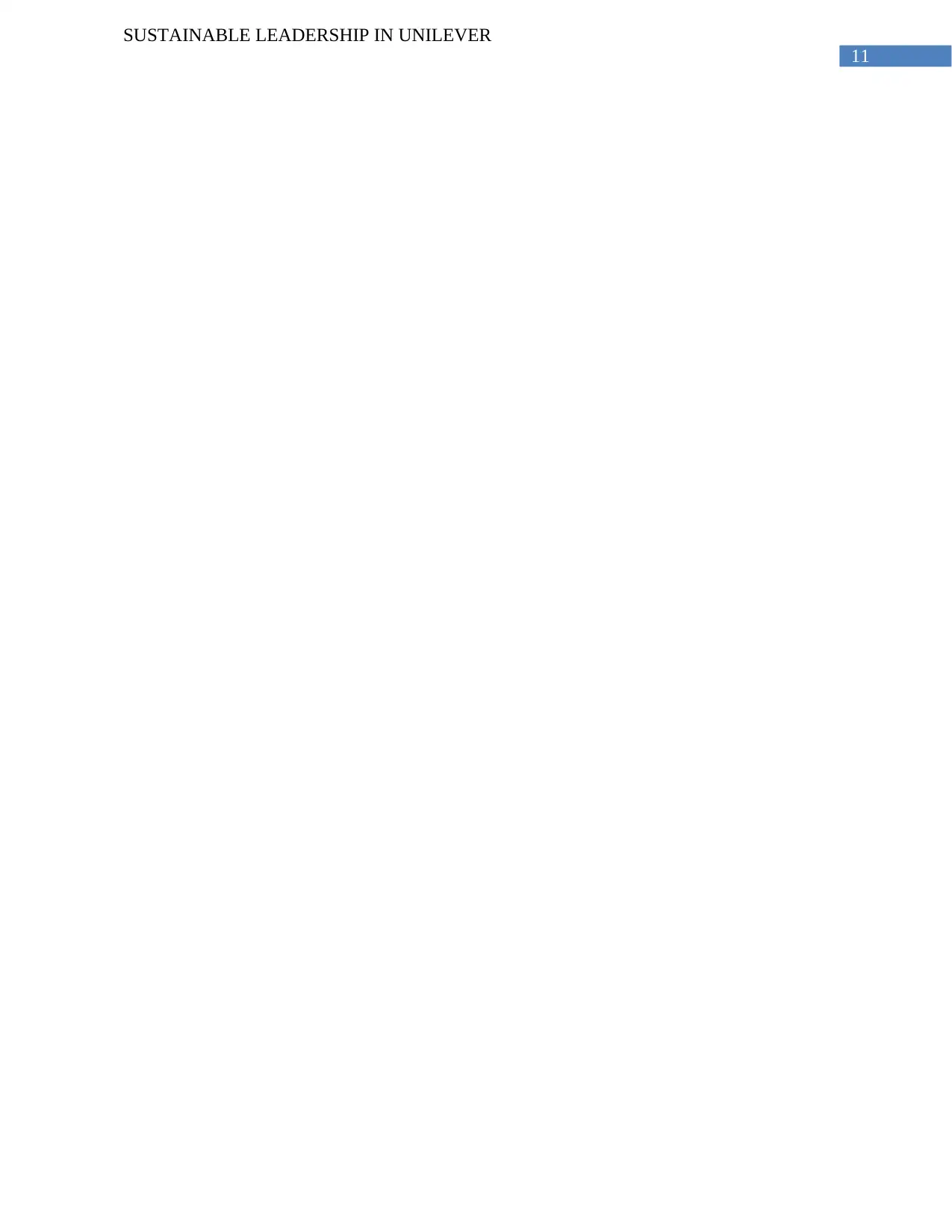
11
SUSTAINABLE LEADERSHIP IN UNILEVER
SUSTAINABLE LEADERSHIP IN UNILEVER
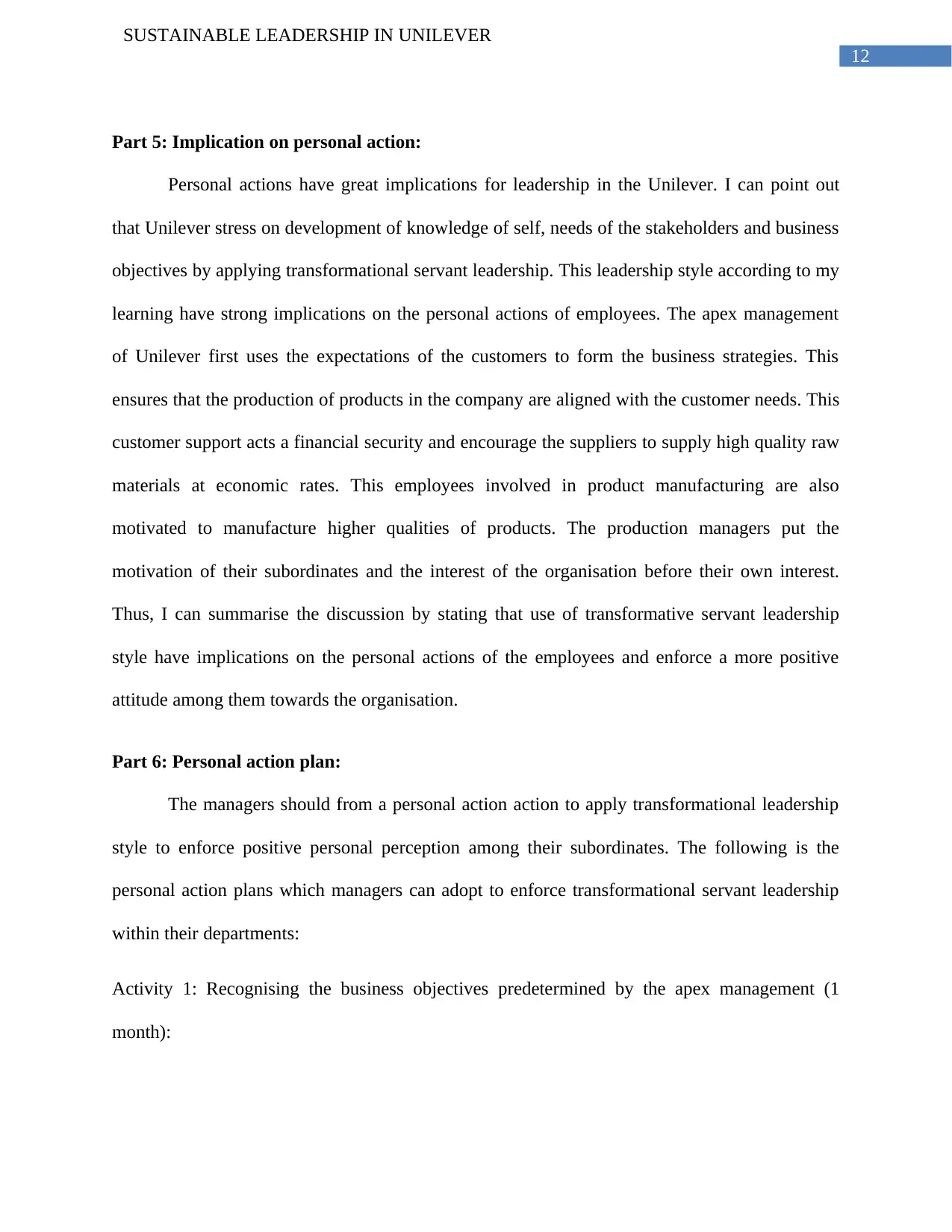
12
SUSTAINABLE LEADERSHIP IN UNILEVER
Part 5: Implication on personal action:
Personal actions have great implications for leadership in the Unilever. I can point out
that Unilever stress on development of knowledge of self, needs of the stakeholders and business
objectives by applying transformational servant leadership. This leadership style according to my
learning have strong implications on the personal actions of employees. The apex management
of Unilever first uses the expectations of the customers to form the business strategies. This
ensures that the production of products in the company are aligned with the customer needs. This
customer support acts a financial security and encourage the suppliers to supply high quality raw
materials at economic rates. This employees involved in product manufacturing are also
motivated to manufacture higher qualities of products. The production managers put the
motivation of their subordinates and the interest of the organisation before their own interest.
Thus, I can summarise the discussion by stating that use of transformative servant leadership
style have implications on the personal actions of the employees and enforce a more positive
attitude among them towards the organisation.
Part 6: Personal action plan:
The managers should from a personal action action to apply transformational leadership
style to enforce positive personal perception among their subordinates. The following is the
personal action plans which managers can adopt to enforce transformational servant leadership
within their departments:
Activity 1: Recognising the business objectives predetermined by the apex management (1
month):
SUSTAINABLE LEADERSHIP IN UNILEVER
Part 5: Implication on personal action:
Personal actions have great implications for leadership in the Unilever. I can point out
that Unilever stress on development of knowledge of self, needs of the stakeholders and business
objectives by applying transformational servant leadership. This leadership style according to my
learning have strong implications on the personal actions of employees. The apex management
of Unilever first uses the expectations of the customers to form the business strategies. This
ensures that the production of products in the company are aligned with the customer needs. This
customer support acts a financial security and encourage the suppliers to supply high quality raw
materials at economic rates. This employees involved in product manufacturing are also
motivated to manufacture higher qualities of products. The production managers put the
motivation of their subordinates and the interest of the organisation before their own interest.
Thus, I can summarise the discussion by stating that use of transformative servant leadership
style have implications on the personal actions of the employees and enforce a more positive
attitude among them towards the organisation.
Part 6: Personal action plan:
The managers should from a personal action action to apply transformational leadership
style to enforce positive personal perception among their subordinates. The following is the
personal action plans which managers can adopt to enforce transformational servant leadership
within their departments:
Activity 1: Recognising the business objectives predetermined by the apex management (1
month):
Paraphrase This Document
Need a fresh take? Get an instant paraphrase of this document with our AI Paraphraser
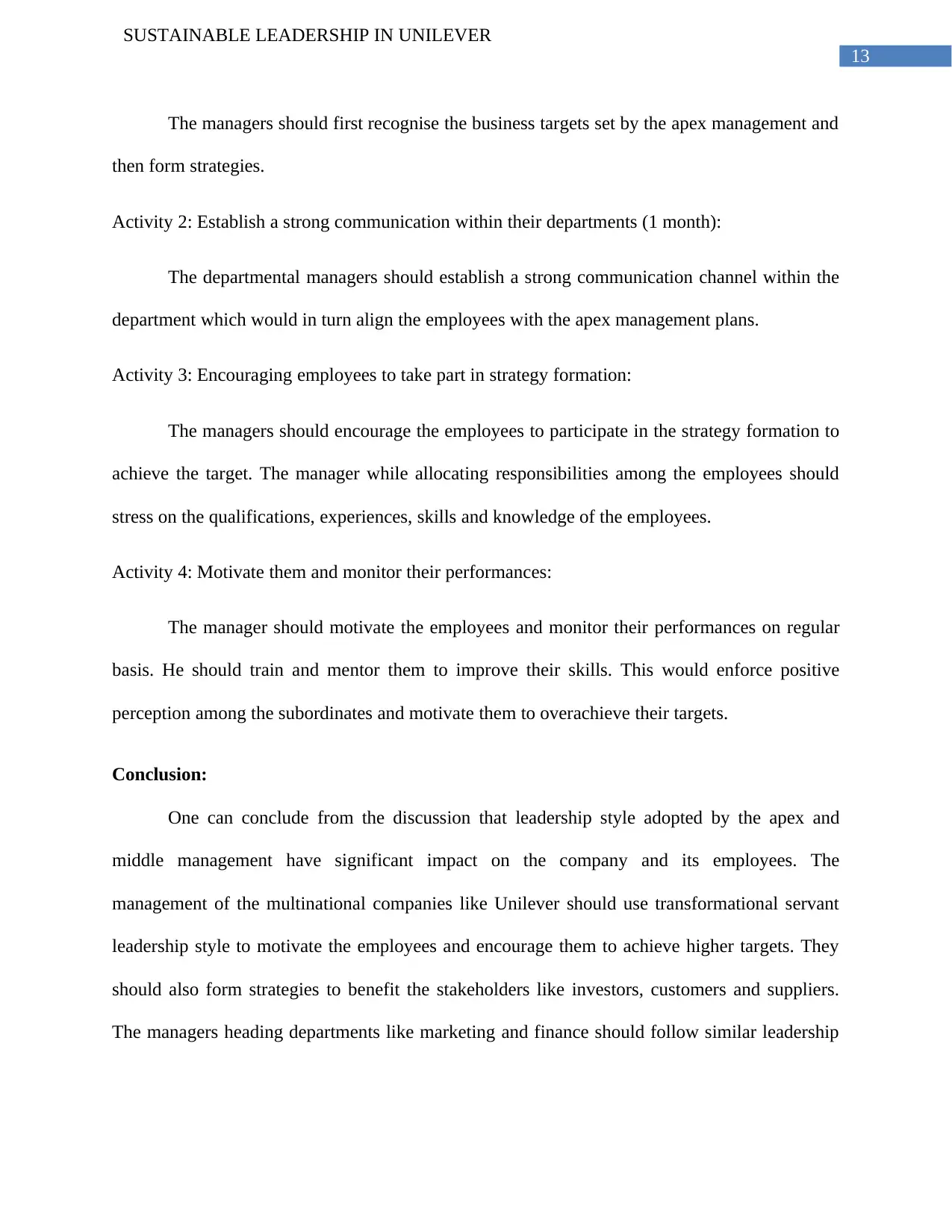
13
SUSTAINABLE LEADERSHIP IN UNILEVER
The managers should first recognise the business targets set by the apex management and
then form strategies.
Activity 2: Establish a strong communication within their departments (1 month):
The departmental managers should establish a strong communication channel within the
department which would in turn align the employees with the apex management plans.
Activity 3: Encouraging employees to take part in strategy formation:
The managers should encourage the employees to participate in the strategy formation to
achieve the target. The manager while allocating responsibilities among the employees should
stress on the qualifications, experiences, skills and knowledge of the employees.
Activity 4: Motivate them and monitor their performances:
The manager should motivate the employees and monitor their performances on regular
basis. He should train and mentor them to improve their skills. This would enforce positive
perception among the subordinates and motivate them to overachieve their targets.
Conclusion:
One can conclude from the discussion that leadership style adopted by the apex and
middle management have significant impact on the company and its employees. The
management of the multinational companies like Unilever should use transformational servant
leadership style to motivate the employees and encourage them to achieve higher targets. They
should also form strategies to benefit the stakeholders like investors, customers and suppliers.
The managers heading departments like marketing and finance should follow similar leadership
SUSTAINABLE LEADERSHIP IN UNILEVER
The managers should first recognise the business targets set by the apex management and
then form strategies.
Activity 2: Establish a strong communication within their departments (1 month):
The departmental managers should establish a strong communication channel within the
department which would in turn align the employees with the apex management plans.
Activity 3: Encouraging employees to take part in strategy formation:
The managers should encourage the employees to participate in the strategy formation to
achieve the target. The manager while allocating responsibilities among the employees should
stress on the qualifications, experiences, skills and knowledge of the employees.
Activity 4: Motivate them and monitor their performances:
The manager should motivate the employees and monitor their performances on regular
basis. He should train and mentor them to improve their skills. This would enforce positive
perception among the subordinates and motivate them to overachieve their targets.
Conclusion:
One can conclude from the discussion that leadership style adopted by the apex and
middle management have significant impact on the company and its employees. The
management of the multinational companies like Unilever should use transformational servant
leadership style to motivate the employees and encourage them to achieve higher targets. They
should also form strategies to benefit the stakeholders like investors, customers and suppliers.
The managers heading departments like marketing and finance should follow similar leadership
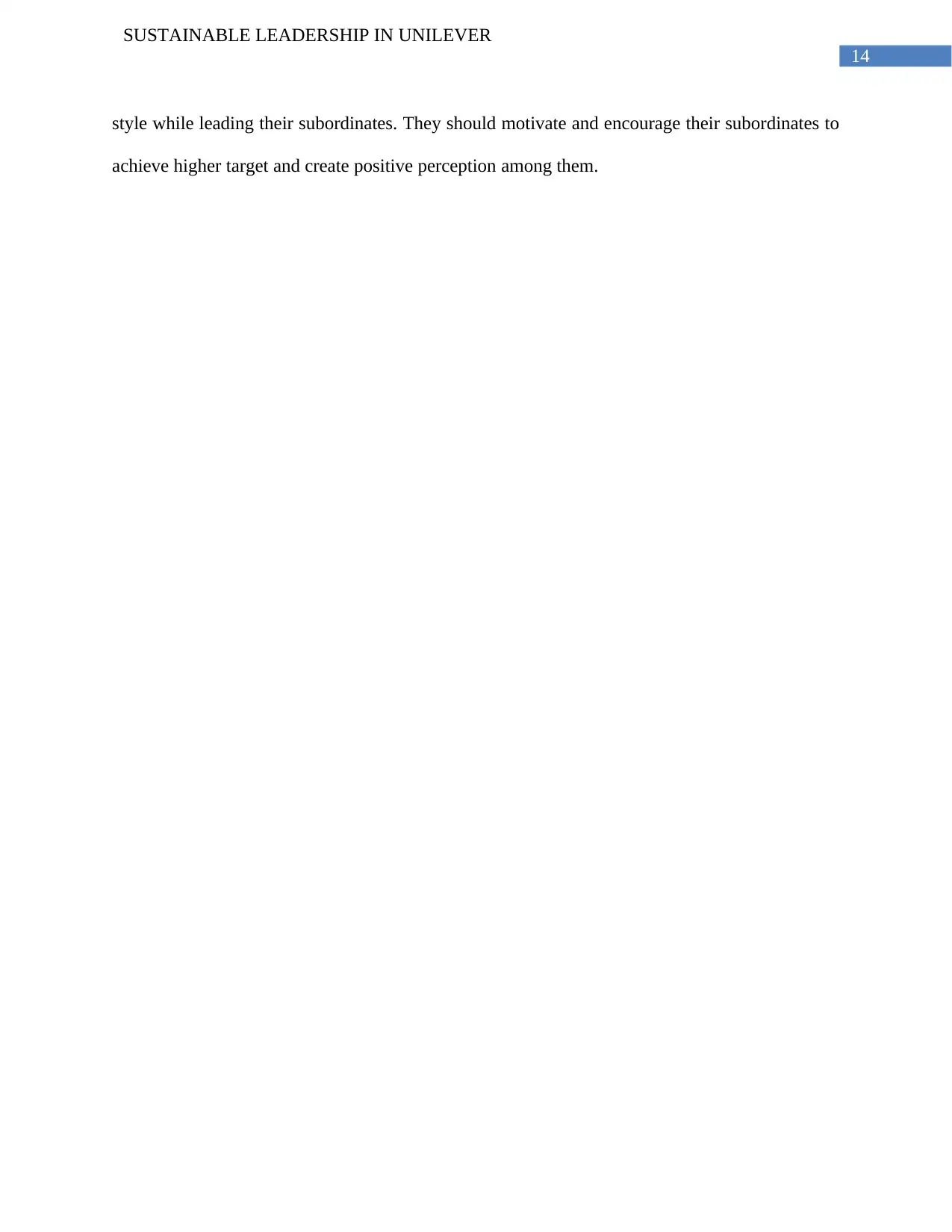
14
SUSTAINABLE LEADERSHIP IN UNILEVER
style while leading their subordinates. They should motivate and encourage their subordinates to
achieve higher target and create positive perception among them.
SUSTAINABLE LEADERSHIP IN UNILEVER
style while leading their subordinates. They should motivate and encourage their subordinates to
achieve higher target and create positive perception among them.
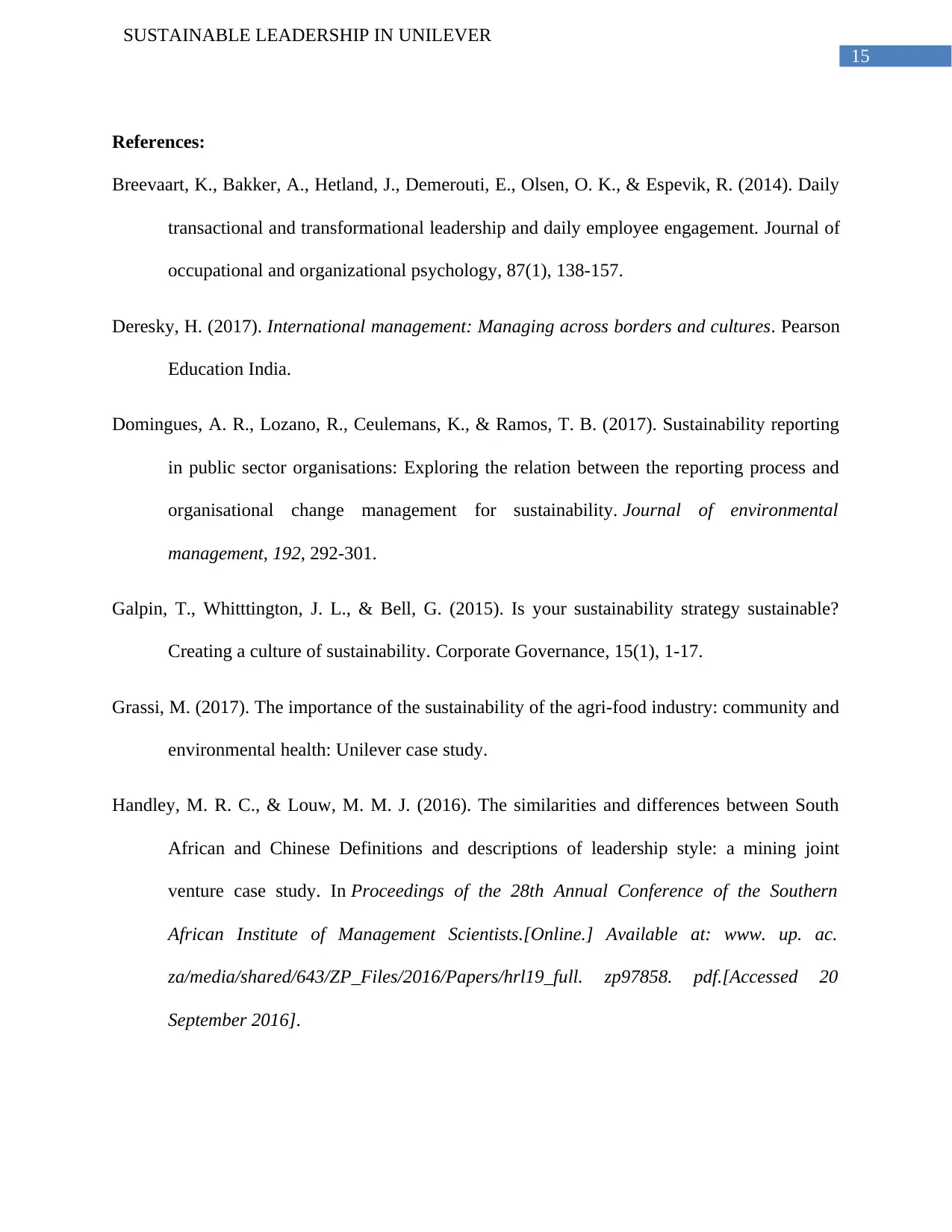
15
SUSTAINABLE LEADERSHIP IN UNILEVER
References:
Breevaart, K., Bakker, A., Hetland, J., Demerouti, E., Olsen, O. K., & Espevik, R. (2014). Daily
transactional and transformational leadership and daily employee engagement. Journal of
occupational and organizational psychology, 87(1), 138-157.
Deresky, H. (2017). International management: Managing across borders and cultures. Pearson
Education India.
Domingues, A. R., Lozano, R., Ceulemans, K., & Ramos, T. B. (2017). Sustainability reporting
in public sector organisations: Exploring the relation between the reporting process and
organisational change management for sustainability. Journal of environmental
management, 192, 292-301.
Galpin, T., Whitttington, J. L., & Bell, G. (2015). Is your sustainability strategy sustainable?
Creating a culture of sustainability. Corporate Governance, 15(1), 1-17.
Grassi, M. (2017). The importance of the sustainability of the agri-food industry: community and
environmental health: Unilever case study.
Handley, M. R. C., & Louw, M. M. J. (2016). The similarities and differences between South
African and Chinese Definitions and descriptions of leadership style: a mining joint
venture case study. In Proceedings of the 28th Annual Conference of the Southern
African Institute of Management Scientists.[Online.] Available at: www. up. ac.
za/media/shared/643/ZP_Files/2016/Papers/hrl19_full. zp97858. pdf.[Accessed 20
September 2016].
SUSTAINABLE LEADERSHIP IN UNILEVER
References:
Breevaart, K., Bakker, A., Hetland, J., Demerouti, E., Olsen, O. K., & Espevik, R. (2014). Daily
transactional and transformational leadership and daily employee engagement. Journal of
occupational and organizational psychology, 87(1), 138-157.
Deresky, H. (2017). International management: Managing across borders and cultures. Pearson
Education India.
Domingues, A. R., Lozano, R., Ceulemans, K., & Ramos, T. B. (2017). Sustainability reporting
in public sector organisations: Exploring the relation between the reporting process and
organisational change management for sustainability. Journal of environmental
management, 192, 292-301.
Galpin, T., Whitttington, J. L., & Bell, G. (2015). Is your sustainability strategy sustainable?
Creating a culture of sustainability. Corporate Governance, 15(1), 1-17.
Grassi, M. (2017). The importance of the sustainability of the agri-food industry: community and
environmental health: Unilever case study.
Handley, M. R. C., & Louw, M. M. J. (2016). The similarities and differences between South
African and Chinese Definitions and descriptions of leadership style: a mining joint
venture case study. In Proceedings of the 28th Annual Conference of the Southern
African Institute of Management Scientists.[Online.] Available at: www. up. ac.
za/media/shared/643/ZP_Files/2016/Papers/hrl19_full. zp97858. pdf.[Accessed 20
September 2016].
Secure Best Marks with AI Grader
Need help grading? Try our AI Grader for instant feedback on your assignments.
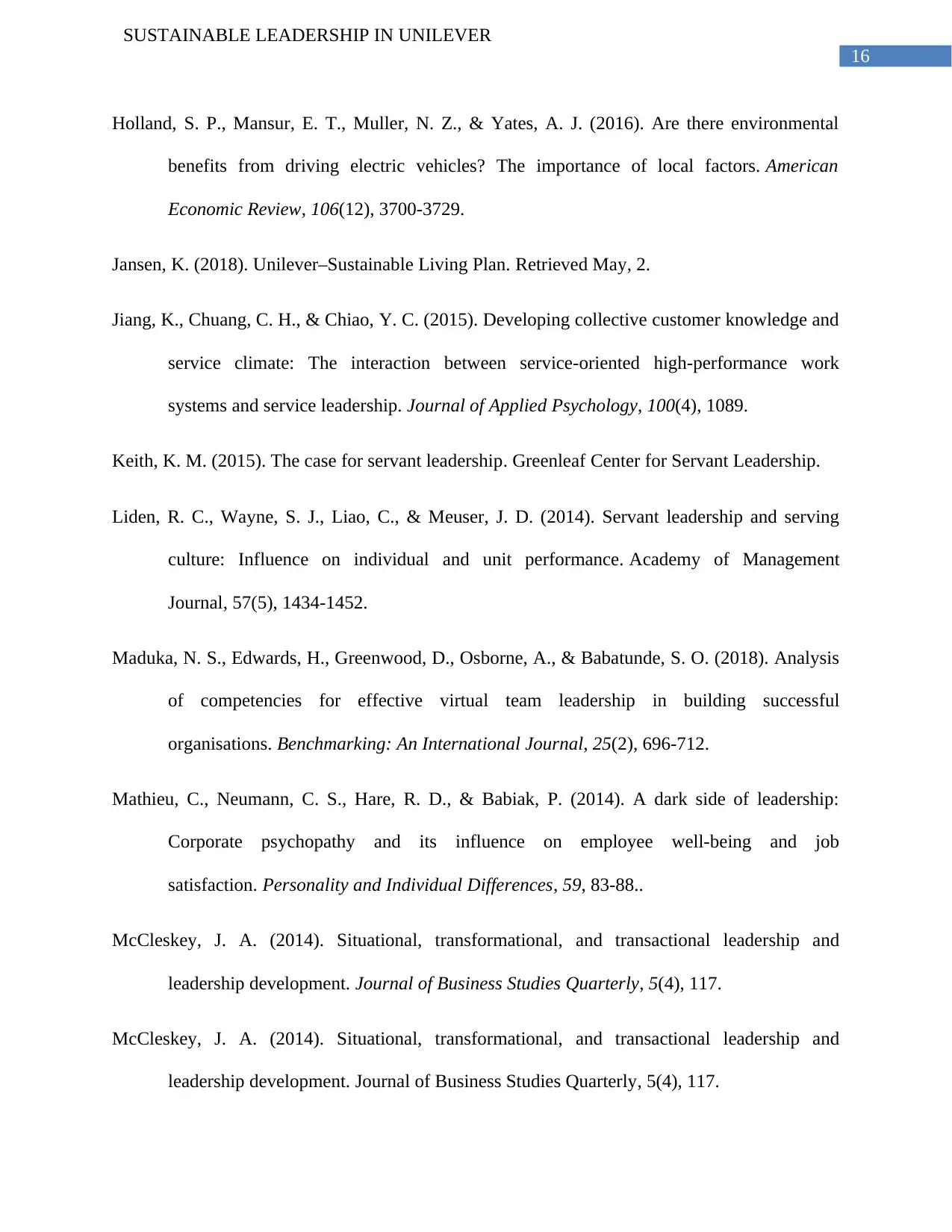
16
SUSTAINABLE LEADERSHIP IN UNILEVER
Holland, S. P., Mansur, E. T., Muller, N. Z., & Yates, A. J. (2016). Are there environmental
benefits from driving electric vehicles? The importance of local factors. American
Economic Review, 106(12), 3700-3729.
Jansen, K. (2018). Unilever–Sustainable Living Plan. Retrieved May, 2.
Jiang, K., Chuang, C. H., & Chiao, Y. C. (2015). Developing collective customer knowledge and
service climate: The interaction between service-oriented high-performance work
systems and service leadership. Journal of Applied Psychology, 100(4), 1089.
Keith, K. M. (2015). The case for servant leadership. Greenleaf Center for Servant Leadership.
Liden, R. C., Wayne, S. J., Liao, C., & Meuser, J. D. (2014). Servant leadership and serving
culture: Influence on individual and unit performance. Academy of Management
Journal, 57(5), 1434-1452.
Maduka, N. S., Edwards, H., Greenwood, D., Osborne, A., & Babatunde, S. O. (2018). Analysis
of competencies for effective virtual team leadership in building successful
organisations. Benchmarking: An International Journal, 25(2), 696-712.
Mathieu, C., Neumann, C. S., Hare, R. D., & Babiak, P. (2014). A dark side of leadership:
Corporate psychopathy and its influence on employee well-being and job
satisfaction. Personality and Individual Differences, 59, 83-88..
McCleskey, J. A. (2014). Situational, transformational, and transactional leadership and
leadership development. Journal of Business Studies Quarterly, 5(4), 117.
McCleskey, J. A. (2014). Situational, transformational, and transactional leadership and
leadership development. Journal of Business Studies Quarterly, 5(4), 117.
SUSTAINABLE LEADERSHIP IN UNILEVER
Holland, S. P., Mansur, E. T., Muller, N. Z., & Yates, A. J. (2016). Are there environmental
benefits from driving electric vehicles? The importance of local factors. American
Economic Review, 106(12), 3700-3729.
Jansen, K. (2018). Unilever–Sustainable Living Plan. Retrieved May, 2.
Jiang, K., Chuang, C. H., & Chiao, Y. C. (2015). Developing collective customer knowledge and
service climate: The interaction between service-oriented high-performance work
systems and service leadership. Journal of Applied Psychology, 100(4), 1089.
Keith, K. M. (2015). The case for servant leadership. Greenleaf Center for Servant Leadership.
Liden, R. C., Wayne, S. J., Liao, C., & Meuser, J. D. (2014). Servant leadership and serving
culture: Influence on individual and unit performance. Academy of Management
Journal, 57(5), 1434-1452.
Maduka, N. S., Edwards, H., Greenwood, D., Osborne, A., & Babatunde, S. O. (2018). Analysis
of competencies for effective virtual team leadership in building successful
organisations. Benchmarking: An International Journal, 25(2), 696-712.
Mathieu, C., Neumann, C. S., Hare, R. D., & Babiak, P. (2014). A dark side of leadership:
Corporate psychopathy and its influence on employee well-being and job
satisfaction. Personality and Individual Differences, 59, 83-88..
McCleskey, J. A. (2014). Situational, transformational, and transactional leadership and
leadership development. Journal of Business Studies Quarterly, 5(4), 117.
McCleskey, J. A. (2014). Situational, transformational, and transactional leadership and
leadership development. Journal of Business Studies Quarterly, 5(4), 117.
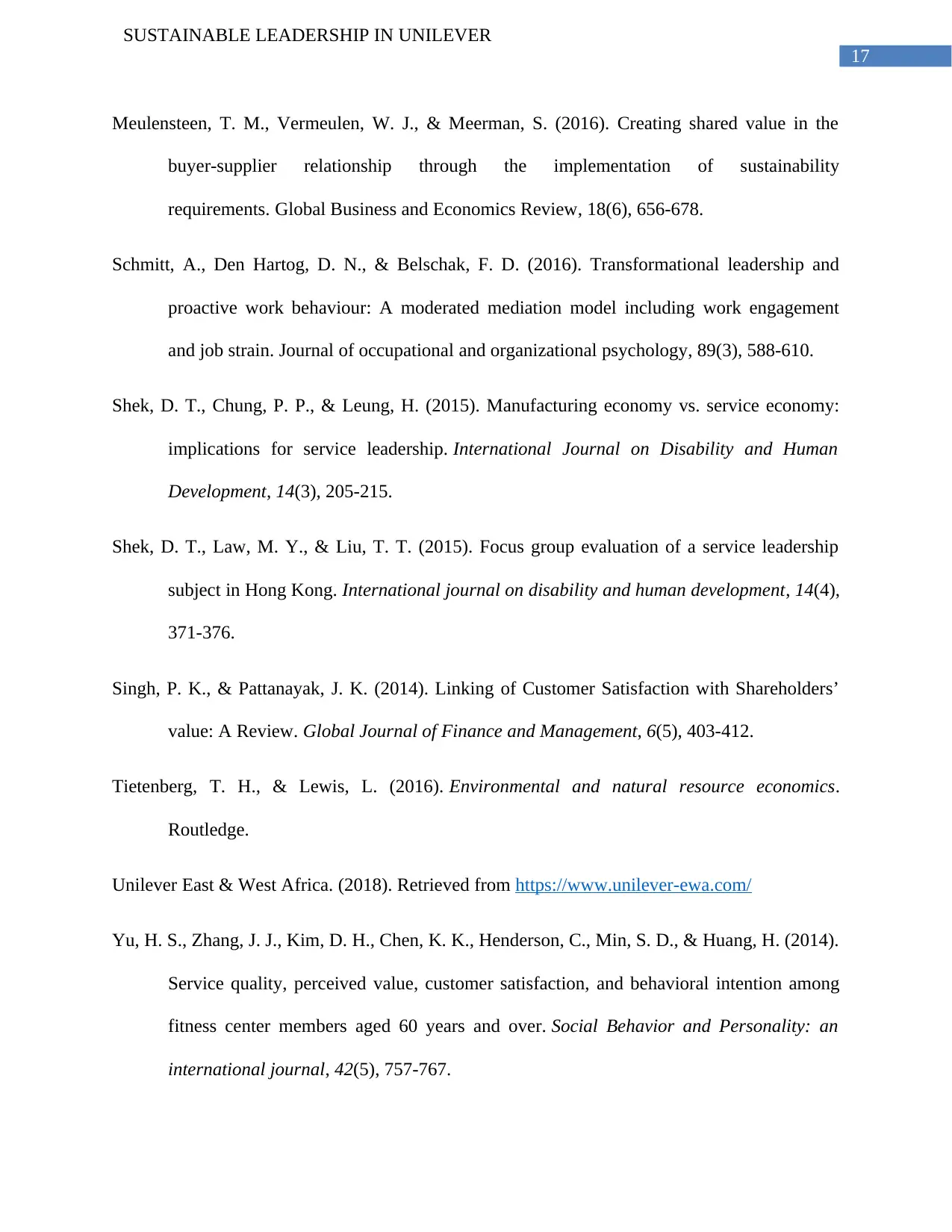
17
SUSTAINABLE LEADERSHIP IN UNILEVER
Meulensteen, T. M., Vermeulen, W. J., & Meerman, S. (2016). Creating shared value in the
buyer-supplier relationship through the implementation of sustainability
requirements. Global Business and Economics Review, 18(6), 656-678.
Schmitt, A., Den Hartog, D. N., & Belschak, F. D. (2016). Transformational leadership and
proactive work behaviour: A moderated mediation model including work engagement
and job strain. Journal of occupational and organizational psychology, 89(3), 588-610.
Shek, D. T., Chung, P. P., & Leung, H. (2015). Manufacturing economy vs. service economy:
implications for service leadership. International Journal on Disability and Human
Development, 14(3), 205-215.
Shek, D. T., Law, M. Y., & Liu, T. T. (2015). Focus group evaluation of a service leadership
subject in Hong Kong. International journal on disability and human development, 14(4),
371-376.
Singh, P. K., & Pattanayak, J. K. (2014). Linking of Customer Satisfaction with Shareholders’
value: A Review. Global Journal of Finance and Management, 6(5), 403-412.
Tietenberg, T. H., & Lewis, L. (2016). Environmental and natural resource economics.
Routledge.
Unilever East & West Africa. (2018). Retrieved from https://www.unilever-ewa.com/
Yu, H. S., Zhang, J. J., Kim, D. H., Chen, K. K., Henderson, C., Min, S. D., & Huang, H. (2014).
Service quality, perceived value, customer satisfaction, and behavioral intention among
fitness center members aged 60 years and over. Social Behavior and Personality: an
international journal, 42(5), 757-767.
SUSTAINABLE LEADERSHIP IN UNILEVER
Meulensteen, T. M., Vermeulen, W. J., & Meerman, S. (2016). Creating shared value in the
buyer-supplier relationship through the implementation of sustainability
requirements. Global Business and Economics Review, 18(6), 656-678.
Schmitt, A., Den Hartog, D. N., & Belschak, F. D. (2016). Transformational leadership and
proactive work behaviour: A moderated mediation model including work engagement
and job strain. Journal of occupational and organizational psychology, 89(3), 588-610.
Shek, D. T., Chung, P. P., & Leung, H. (2015). Manufacturing economy vs. service economy:
implications for service leadership. International Journal on Disability and Human
Development, 14(3), 205-215.
Shek, D. T., Law, M. Y., & Liu, T. T. (2015). Focus group evaluation of a service leadership
subject in Hong Kong. International journal on disability and human development, 14(4),
371-376.
Singh, P. K., & Pattanayak, J. K. (2014). Linking of Customer Satisfaction with Shareholders’
value: A Review. Global Journal of Finance and Management, 6(5), 403-412.
Tietenberg, T. H., & Lewis, L. (2016). Environmental and natural resource economics.
Routledge.
Unilever East & West Africa. (2018). Retrieved from https://www.unilever-ewa.com/
Yu, H. S., Zhang, J. J., Kim, D. H., Chen, K. K., Henderson, C., Min, S. D., & Huang, H. (2014).
Service quality, perceived value, customer satisfaction, and behavioral intention among
fitness center members aged 60 years and over. Social Behavior and Personality: an
international journal, 42(5), 757-767.
1 out of 18
Related Documents
Your All-in-One AI-Powered Toolkit for Academic Success.
+13062052269
info@desklib.com
Available 24*7 on WhatsApp / Email
![[object Object]](/_next/static/media/star-bottom.7253800d.svg)
Unlock your academic potential
© 2024 | Zucol Services PVT LTD | All rights reserved.




